How to Write the AP Lit Prose Essay with Examples
March 30, 2024

AP Lit Prose Essay Examples – The College Board’s Advanced Placement Literature and Composition Course is one of the most enriching experiences that high school students can have. It exposes you to literature that most people don’t encounter until college , and it helps you develop analytical and critical thinking skills that will enhance the quality of your life, both inside and outside of school. The AP Lit Exam reflects the rigor of the course. The exam uses consistent question types, weighting, and scoring parameters each year . This means that, as you prepare for the exam, you can look at previous questions, responses, score criteria, and scorer commentary to help you practice until your essays are perfect.

What is the AP Lit Free Response testing?
In AP Literature, you read books, short stories, and poetry, and you learn how to commit the complex act of literary analysis . But what does that mean? Well, “to analyze” literally means breaking a larger idea into smaller and smaller pieces until the pieces are small enough that they can help us to understand the larger idea. When we’re performing literary analysis, we’re breaking down a piece of literature into smaller and smaller pieces until we can use those pieces to better understand the piece of literature itself.
So, for example, let’s say you’re presented with a passage from a short story to analyze. The AP Lit Exam will ask you to write an essay with an essay with a clear, defensible thesis statement that makes an argument about the story, based on some literary elements in the short story. After reading the passage, you might talk about how foreshadowing, allusion, and dialogue work together to demonstrate something essential in the text. Then, you’ll use examples of each of those three literary elements (that you pull directly from the passage) to build your argument. You’ll finish the essay with a conclusion that uses clear reasoning to tell your reader why your argument makes sense.
AP Lit Prose Essay Examples (Continued)
But what’s the point of all of this? Why do they ask you to write these essays?
Well, the essay is, once again, testing your ability to conduct literary analysis. However, the thing that you’re also doing behind that literary analysis is a complex process of both inductive and deductive reasoning. Inductive reasoning takes a series of points of evidence and draws a larger conclusion. Deductive reasoning departs from the point of a broader premise and draws a singular conclusion. In an analytical essay like this one, you’re using small pieces of evidence to draw a larger conclusion (your thesis statement) and then you’re taking your thesis statement as a larger premise from which you derive your ultimate conclusion.
So, the exam scorers are looking at your ability to craft a strong thesis statement (a singular sentence that makes an argument), use evidence and reasoning to support that argument, and then to write the essay well. This is something they call “sophistication,” but they’re looking for well-organized thoughts carried through clear, complete sentences.
This entire process is something you can and will use throughout your life. Law, engineering, medicine—whatever pursuit, you name it—utilizes these forms of reasoning to run experiments, build cases, and persuade audiences. The process of this kind of clear, analytical thinking can be honed, developed, and made easier through repetition.
Practice Makes Perfect
Because the AP Literature Exam maintains continuity across the years, you can pull old exam copies, read the passages, and write responses. A good AP Lit teacher is going to have you do this time and time again in class until you have the formula down. But, it’s also something you can do on your own, if you’re interested in further developing your skills.
AP Lit Prose Essay Examples
Let’s take a look at some examples of questions, answers and scorer responses that will help you to get a better idea of how to craft your own AP Literature exam essays.
In the exam in 2023, students were asked to read a poem by Alice Cary titled “Autumn,” which was published in 1874. In it, the speaker contemplates the start of autumn. Then, students are asked to craft a well-written essay which uses literary techniques to convey the speaker’s complex response to the changing seasons.
The following is an essay that received a perfect 6 on the exam. There are grammar and usage errors throughout the essay, which is important to note: even though the writer makes some mistakes, the structure and form of their argument was strong enough to merit a 6. This is what your scorers will be looking for when they read your essay.
Example Essay
Romantic and hyperbolic imagery is used to illustrate the speaker’s unenthusiastic opinion of the coming of autumn, which conveys Cary’s idea that change is difficult to accept but necessary for growth.
Romantic imagery is utilized to demonstrate the speaker’s warm regard for the season of summer and emphasize her regretfulness for autumn’s coming, conveying the uncomfortable change away from idyllic familiarity. Summer, is portrayed in the image of a woman who “from her golden collar slips/and strays through stubble fields/and moans aloud.” Associated with sensuality and wealth, the speaker implies the interconnection between a season and bounty, comfort, and pleasure. Yet, this romantic view is dismantled by autumn, causing Summer to “slip” and “stray through stubble fields.” Thus, the coming of real change dethrones a constructed, romantic personification of summer, conveying the speaker’s reluctance for her ideal season to be dethroned by something much less decorated and adored.
Summer, “she lies on pillows of the yellow leaves,/ And tries the old tunes for over an hour”, is contrasted with bright imagery of fallen leaves/ The juxtaposition between Summer’s character and the setting provides insight into the positivity of change—the yellow leaves—by its contrast with the failures of attempting to sustain old habits or practices, “old tunes”. “She lies on pillows” creates a sympathetic, passive image of summer in reaction to the coming of Autumn, contrasting her failures to sustain “old tunes.” According to this, it is understood that the speaker recognizes the foolishness of attempting to prevent what is to come, but her wishfulness to counter the natural progression of time.
Hyperbolic imagery displays the discrepancies between unrealistic, exaggerated perceptions of change and the reality of progress, continuing the perpetuation of Cary’s idea that change must be embraced rather than rejected. “Shorter and shorter now the twilight clips/The days, as though the sunset gates they crowd”, syntax and diction are used to literally separate different aspects of the progression of time. In an ironic parallel to the literal language, the action of twilight’s “clip” and the subject, “the days,” are cut off from each other into two different lines, emphasizing a sense of jarring and discomfort. Sunset, and Twilight are named, made into distinct entities from the day, dramatizing the shortening of night-time into fall. The dramatic, sudden implications for the change bring to mind the switch between summer and winter, rather than a transitional season like fall—emphasizing the Speaker’s perspective rather than a factual narration of the experience.
She says “the proud meadow-pink hangs down her head/Against the earth’s chilly bosom, witched with frost”. Implying pride and defeat, and the word “witched,” the speaker brings a sense of conflict, morality, and even good versus evil into the transition between seasons. Rather than a smooth, welcome change, the speaker is practically against the coming of fall. The hyperbole present in the poem serves to illustrate the Speaker’s perspective and ideas on the coming of fall, which are characterized by reluctance and hostility to change from comfort.
The topic of this poem, Fall–a season characterized by change and the deconstruction of the spring and summer landscape—is juxtaposed with the final line which evokes the season of Spring. From this, it is clear that the speaker appreciates beautiful and blossoming change. However, they resent that which destroys familiar paradigms and norms. Fall, seen as the death of summer, is characterized as a regression, though the turning of seasons is a product of the literal passage of time. Utilizing romantic imagery and hyperbole to shape the Speaker’s perspective, Cary emphasizes the need to embrace change though it is difficult, because growth is not possible without hardship or discomfort.
Scoring Criteria: Why did this essay do so well?
When it comes to scoring well, there are some rather formulaic things that the judges are searching for. You might think that it’s important to “stand out” or “be creative” in your writing. However, aside from concerns about “sophistication,” which essentially means you know how to organize thoughts into sentences and you can use language that isn’t entirely elementary, you should really focus on sticking to a form. This will show the scorers that you know how to follow that inductive/deductive reasoning process that we mentioned earlier, and it will help to present your ideas in the most clear, coherent way possible to someone who is reading and scoring hundreds of essays.
So, how did this essay succeed? And how can you do the same thing?
First: The Thesis
On the exam, you can either get one point or zero points for your thesis statement. The scorers said, “The essay responds to the prompt with a defensible thesis located in the introductory paragraph,” which you can read as the first sentence in the essay. This is important to note: you don’t need a flowery hook to seduce your reader; you can just start this brief essay with some strong, simple, declarative sentences—or go right into your thesis.
What makes a good thesis? A good thesis statement does the following things:
- Makes a claim that will be supported by evidence
- Is specific and precise in its use of language
- Argues for an original thought that goes beyond a simple restating of the facts
If you’re sitting here scratching your head wondering how you come up with a thesis statement off the top of your head, let me give you one piece of advice: don’t.
The AP Lit scoring criteria gives you only one point for the thesis for a reason: they’re just looking for the presence of a defensible claim that can be proven by evidence in the rest of the essay.
Second: Write your essay from the inside out
While the thesis is given one point, the form and content of the essay can receive anywhere from zero to four points. This is where you should place the bulk of your focus.
My best advice goes like this:
- Choose your evidence first
- Develop your commentary about the evidence
- Then draft your thesis statement based on the evidence that you find and the commentary you can create.
It will seem a little counterintuitive: like you’re writing your essay from the inside out. But this is a fundamental skill that will help you in college and beyond. Don’t come up with an argument out of thin air and then try to find evidence to support your claim. Look for the evidence that exists and then ask yourself what it all means. This will also keep you from feeling stuck or blocked at the beginning of the essay. If you prepare for the exam by reviewing the literary devices that you learned in the course and practice locating them in a text, you can quickly and efficiently read a literary passage and choose two or three literary devices that you can analyze.
Third: Use scratch paper to quickly outline your evidence and commentary
Once you’ve located two or three literary devices at work in the given passage, use scratch paper to draw up a quick outline. Give each literary device a major bullet point. Then, briefly point to the quotes/evidence you’ll use in the essay. Finally, start to think about what the literary device and evidence are doing together. Try to answer the question: what meaning does this bring to the passage?
A sample outline for one paragraph of the above essay might look like this:
Romantic imagery
Portrayal of summer
- Woman who “from her golden collar… moans aloud”
- Summer as bounty
Contrast with Autumn
- Autumn dismantles Summer
- “Stray through stubble fields”
- Autumn is change; it has the power to dethrone the romance of Summer/make summer a bit meaningless
Recognition of change in a positive light
- Summer “lies on pillows / yellow leaves / tries old tunes”
- Bright imagery/fallen leaves
- Attempt to maintain old practices fails: “old tunes”
- But! There is sympathy: “lies on pillows”
Speaker recognizes: she can’t prevent what is to come; wishes to embrace natural passage of time
By the time the writer gets to the end of the outline for their paragraph, they can easily start to draw conclusions about the paragraph based on the evidence they have pulled out. You can see how that thinking might develop over the course of the outline.
Then, the speaker would take the conclusions they’ve drawn and write a “mini claim” that will start each paragraph. The final bullet point of this outline isn’t the same as the mini claim that comes at the top of the second paragraph of the essay, however, it is the conclusion of the paragraph. You would do well to use the concluding thoughts from your outline as the mini claim to start your body paragraph. This will make your paragraphs clear, concise, and help you to construct a coherent argument.
Repeat this process for the other one or two literary devices that you’ve chosen to analyze, and then: take a step back.
Fourth: Draft your thesis
Once you quickly sketch out your outline, take a moment to “stand back” and see what you’ve drafted. You’ll be able to see that, among your two or three literary devices, you can draw some commonality. You might be able to say, as the writer did here, that romantic and hyperbolic imagery “illustrate the speaker’s unenthusiastic opinion of the coming of autumn,” ultimately illuminating the poet’s idea “that change is difficult to accept but necessary for growth.”
This is an original argument built on the evidence accumulated by the student. It directly answers the prompt by discussing literary techniques that “convey the speaker’s complex response to the changing seasons.” Remember to go back to the prompt and see what direction they want you to head with your thesis, and craft an argument that directly speaks to that prompt.
Then, move ahead to finish your body paragraphs and conclusion.
Fifth: Give each literary device its own body paragraph
In this essay, the writer examines the use of two literary devices that are supported by multiple pieces of evidence. The first is “romantic imagery” and the second is “hyperbolic imagery.” The writer dedicates one paragraph to each idea. You should do this, too.
This is why it’s important to choose just two or three literary devices. You really don’t have time to dig into more. Plus, more ideas will simply cloud the essay and confuse your reader.
Using your outline, start each body paragraph with a “mini claim” that makes an argument about what it is you’ll be saying in your paragraph. Lay out your pieces of evidence, then provide commentary for why your evidence proves your point about that literary device.
Move onto the next literary device, rinse, and repeat.
Sixth: Commentary and Conclusion
Finally, you’ll want to end this brief essay with a concluding paragraph that restates your thesis, briefly touches on your most important points from each body paragraph, and includes a development of the argument that you laid out in the essay.
In this particular example essay, the writer concludes by saying, “Utilizing romantic imagery and hyperbole to shape the Speaker’s perspective, Cary emphasizes the need to embrace change though it is difficult, because growth is not possible without hardship or discomfort.” This is a direct restatement of the thesis. At this point, you’ll have reached the end of your essay. Great work!
Seventh: Sophistication
A final note on scoring criteria: there is one point awarded to what the scoring criteria calls “sophistication.” This is evidenced by the sophistication of thought and providing a nuanced literary analysis, which we’ve already covered in the steps above.
There are some things to avoid, however:
- Sweeping generalizations, such as, “From the beginning of human history, people have always searched for love,” or “Everyone goes through periods of darkness in their lives, much like the writer of this poem.”
- Only hinting at possible interpretations instead of developing your argument
- Oversimplifying your interpretation
- Or, by contrast, using overly flowery or complex language that does not meet your level of preparation or the context of the essay.
Remember to develop your argument with nuance and complexity and to write in a style that is academic but appropriate for the task at hand.
If you want more practice or to check out other exams from the past, go to the College Board’s website .

Brittany Borghi
After earning a BA in Journalism and an MFA in Nonfiction Writing from the University of Iowa, Brittany spent five years as a full-time lecturer in the Rhetoric Department at the University of Iowa. Additionally, she’s held previous roles as a researcher, full-time daily journalist, and book editor. Brittany’s work has been featured in The Iowa Review, The Hopkins Review, and the Pittsburgh City Paper, among others, and she was also a 2021 Pushcart Prize nominee.
- 2-Year Colleges
- Application Strategies
- Big Picture
- Career & Personality Assessment
- College Essay
- College Search/Knowledge
- College Success
- Costs & Financial Aid
- Dental School Admissions
- Extracurricular Activities
- Graduate School Admissions
- High School Success
- High Schools
- Law School Admissions
- Medical School Admissions
- Navigating the Admissions Process
- Online Learning
- Private High School Spotlight
- Summer Program Spotlight
- Summer Programs
- Test Prep Provider Spotlight

“Innovative and invaluable…use this book as your college lifeline.”
— Lynn O'Shaughnessy
Nationally Recognized College Expert
College Planning in Your Inbox
Join our information-packed monthly newsletter.
Sign Up Now
Breaking Down Different AP Essays
Most AP exams involve a multiple choice section, so being able to answer these questions quickly and accurately is key to success! In most AP classes, your teacher will administer practice multiple choice questions to you in class to get you prepared for the test, and there are always plethoras of practice questions that can be found online.
However, there is more to an AP exam than the Multiple Choice section: AP exams have a free-response component. This can include short-answer questions, document-based questions, long-essay questions, and more.
This can be daunting to some people, but once you take the time to understand what types of questions are asked, you are bound to feel much more confident! This Simple Studies article is here to detail some of the different types of essays you may see on your exams!
The essay types included in this article are the Document-Based Question, the Long-Essay Question, the Synthesis essay, the Rhetorical Analysis, the Argumentative essay, Poetry essays, Prose Passage essays, and Thematic Analysis essays.
1. Document-Based Question
If you talk to someone that has taken a History AP class (APUSH, World History, European History) they most likely will mention the DBQ as part of their experience in that class. That is because the history DBQ is a crucial part of the exams, and it definitely takes time to master.
You are asked to analyze a certain historical issue with the assistance of some historical documents. Usually, there are 9 documents, but in 2020, the altered exams yielded only 5 documents.
Nonetheless, you must quickly analyze the documents to form a coherent argument that can be proven given the information in the documents. This essay is quite difficult because some of the documents can be difficult to decipher, but it also helps to have sources to base your arguments on! In normal years, you are given a 15 minute reading period for the documents and 45 minutes to create your essay.
2. Long-Essay Question
The LEQ is another one of the essays found on AP History exams. In comparison to the DBQ, the LEQ does not provide you with any documents or resources. Therefore, it tests your ability to recall information learned throughout the year, and your ability to mold those events into a strong essay .
You traditionally are given a prompt and must come up with a thesis with specific examples that you’ll be arguing in your essay. Also, for AP History exams, you are given different prompts to choose from, in comparison to the DBQ, where you must write a response to the given prompt and use the given documents. You have 35 minutes to complete the essay.
3. The Synthesis Essay
This is one of the essays you will be writing if you take the AP Language and Composition exam. You are given a variety of sources that relate to a given topic, and you must create an argument that synthesizes at least three of the sources to support your thesis . You are allotted a 15-minute reading period, and a 40-minute writing period.
4. The Rhetorical Analysis
This is another one of the essays written during the AP Language and Composition exam. You will read one non-fiction text and you must analyze how that author’s rhetorical strategies and language choices impact the purpose of the text and the intended meaning .
Just to throw out some examples of rhetorical devices: alliterations, allusions, and metaphors are some common ones. You may have been studying these in all of your English classes, and this essay gives you the opportunity to showcase what you’ve learned and to apply them to a non-fiction work. It is recommended to spend about 25 minutes writing the essay.
5. The Argumentative Essay
For this AP Lang essay, you will be expected to read and understand a quote or a passage in order to form an evidence-based response. An example may be reading a quote from a historical person, and writing an essay that argues the “extent to which” that person’s ideas are valid. Being able to write a very convincing response is key. The suggested time is 40 minutes.
6. The Poetry Essay
This is one of the essays that are part of the AP Literature and Composition exam. For this assignment, you are given a poem and must analyze it on the spot. This can be difficult at first as you don’t have a very long time to dissect the poem and think for an extended period of time as to what the meaning is. In your response to the poem, you must incorporate references to themes, literary devices, persona, and diction. The suggested time is 40 minutes.
7. The Prose Passage Essay
This is the second AP Lit essay. It is somewhat similar to the poetry essay, but instead of a poem, you are given a prose passage to analyze . Some things that can make your argument very strong is paying attention to themes, literary devices, characters/persona, and diction. The suggested time is also 40 minutes.
8. The Thematic Analysis Essay
This is the third and final AP Literature essay type. This essay gives the student a bit more freedom in comparison to the prose and poetry essays because what you write about is more so your choice! For this essay, you will analyze a specific concept, issue, or element in a “work of literary merit”. The suggested writing time is 40 minutes as well.

Maximizing Your School Vacations

A Guide to Choosing the Right Professors

Best Majors for Medical School

Best Foods to Eat for Studying

Staying Healthy at School

How to Combat Test Anxiety

How to Pay Better Attention in School

Digital Detoxes

Benefits of Being a Musician

Ivy News: Columbia Drops out of Undergrad Rankings
Ivy news: brown university student protests, ivy news: harvard university president resigns.

Learning New Languages (Scientifically)

How to Study for the MCAT

How to Combat Procrastination With Science

Psychology of Color in Study Spaces

5 Ways to Level Up Academically This Winter

The Importance of Proper Nutrition: Perform at Your Best

Is Music Useful for Studying?

How to Learn a Language as a Full-Time Student

How to Get a 5 on AP History Exams
Blog articles.

GET THE LATEST FROM SIMPLE STUDIES + FRANK ADVICE
Get updates on resources, scholarships, & more 👇.

AP® English Literature
The best ap® english literature review guide for 2024.
- The Albert Team
- Last Updated On: January 29, 2024
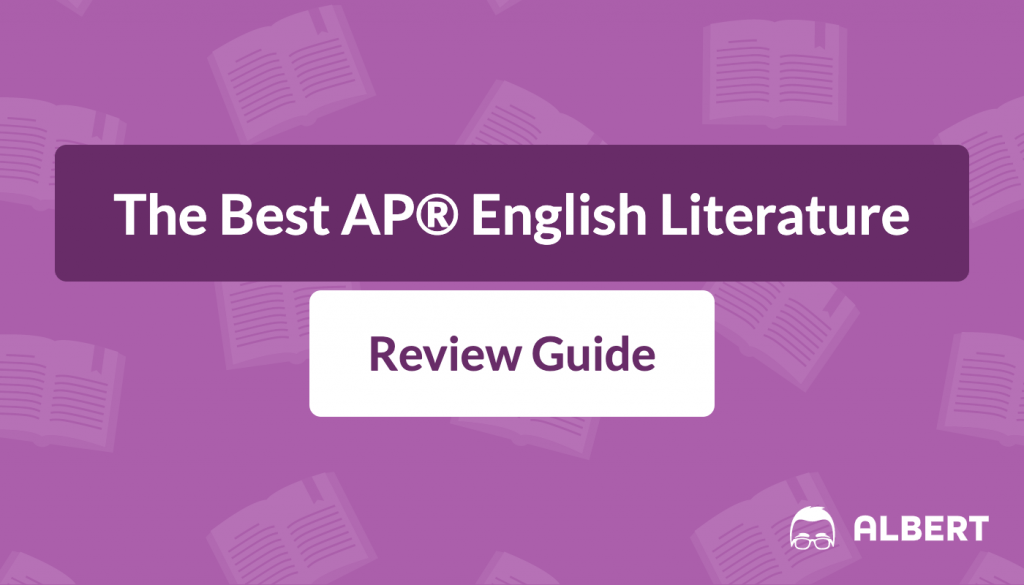
Scoring a 5 on the AP® English Literature and Composition exam is no easy task. In 2019, for example, only 6.2% of students earned a 5 on the test. While this statistic may be discouraging at first glance, it does indicate that a perfect score is possible for those willing to do extra preparation and practice. In 2022, nearly 17% of test-takers earned a 5 – a big improvement!
It may take some hard work, but it’s possible to ace this exam! We’re here to help.
In this comprehensive review, we’ll unpack the exam’s basic format, analyze the common structures and shapes of AP® Literature questions, provide useful tips and strategies for scoring a 5, and offer a variety of helpful additional resources and study tools.
Let’s get to it!
What We Review
How is the AP® English Literature and Composition Exam formatted?
The AP® English Literature and Composition exam is divided into two sections: multiple-choice and free-response.
The multiple-choice section is broken into five chunks equipped with 8-13 questions each, totaling 55 questions. You will be asked to analyze excerpts from diverse literary texts, including prose fiction, drama, or poetry. Moreover, there will always be at least 2 prose fiction passages and 2 poems in this section of the exam. The fifth text can be either.
The multiple-choice section has a time limit of 1 hour, and it counts as 45% of your overall exam score.
Section 2 of the exam, often informally called the “essay section,” contains 3 free-response prompts which demand literary analysis of a given poem, a passage of prose fiction, or an excerpt from a play.
The first two prompts will provide a passage or a poem requiring analysis, while the third and final prompt will ask you to engage with a concept, issue, or element in a literary work that you are expected to have encountered during the school year. A list of appropriate works is provided for the third prompt.
You have 2 hours to complete Section 2, which comprises 55% of your final exam score.
Return to the Table of Contents
How Long is the AP® English Literature and Composition Exam?
The AP® English Literature and Composition exam is 3 hours long. Students will have 1 hour to complete the multiple-choice section (55 questions) and 2 hours to complete the free-response section (3 questions).
Since you must answer 55 questions in 60 minutes on the multiple-choice portion of the exam, you should pace yourself at about 1 minute per question and about 12 minutes per passage.
Likewise, since the free response section is timed at 120 minutes, you should aim to complete each essay in 40 minutes or under.
Time yourself when you practice, and don’t get caught up trying to answer a question that you totally do not know the answer to. Don’t rush through the test, but don’t take too much time.
How Many Questions Does the AP® English Literature and Composition Exam Have?
Section i: multiple-choice.
- 5 passages, 55 questions total: 8-13 questions per passage
- Passages include 2 Prose, 2 Poems, and 1 of either
Section II: Free-Response
- 1 literary analysis of a given poem
- 1 literary analysis of a given passage of prose fiction
- 1 literary argument
What Topics are Covered on the AP® English Literature and Composition Exam?
Perhaps the best way to begin thinking about the topics covered on the exam is through a holistic approach. Overall, the test assesses the six big ideas covered within the AP® English Literature and Composition course itself:
- Figurative Language
- Literary Argumentation
These components comprise the whole exam, and you will be tested specifically on material from these broad concepts.
Now, let’s return to its formatting. Remember, the exam is divided into multiple choice and free response, each carrying its own set of demands and topics.
Section I: Multiple Choice
Since the AP® English Literature and Composition exam is a skills-based test, there’s no way to know what specific passages or topics might appear on the official exam. Rather, CollegeBoard uses a variety of excerpts from literary texts, including prose, poetry, and drama.
The passages often range from the 16th to the 21st century, and the authors and literary works change yearly. So it is imperative that you sharpen your critical reading skills and hone your ability to engage with the forms, styles, and content of a diverse range of literature.
However, we have some good news. We do know how the multiple choice section is organized and weighted. It is divided into three broad units: short fiction, poetry, and longer fiction or drama, with each unit carrying its own weighted percentage. The chart below outlines this weighting:
Moreover, the multiple choice portion of the exam can be further broken down into 7 assessed skills:
Remember, the multiple-choice section will include five sets of 8 to 13 questions per set, so be prepared to encounter many if not all of these skill sets per passage. But it is safe to say that you should review certain skill categories more thoroughly than others on account of how frequently they appear on the exam.
Below we’ve compiled a descending list of priorities for you to consider.
- Skill Category 4 : Explain the function of the narrator or speaker
- Skill Category 1 : Explain the function of character
- Skill Category 3 : Explain the function of plot and structure
- Skill Category 5 : Explain the function of word choice, imagery, and symbols
- Skill Category 7 : Develop textually substantiated arguments about interpretations of part or all of a text
- Skill Category 6 : Explain the function of comparison
- Skill Category 2 . Explain the function of setting
Section 4, “Explain the function of the narrator or speaker,” should be studied the most since it holds a substantial amount of weight in determining your score. Skill category 2, as you see above, accounts for a small percentage of the exam so we recommend you don’t spend hours upon hours brushing up on the function of the setting. Don’t blow it off, though!
Section II: Free Response
Like the multiple choice section, the free response portion is also skills-based. We cannot predict what specific passages or poems will make it onto the test, but we do know the type(s) of essays you will be required to write:
- 1 Poetry Analysis: After reading a poem of 100 to 300 words, you will respond to a prompt based on the poem with a well-developed essay. Your essay, of course, must offer a defensible interpretation, make adequate use of textual evidence, engage critically with cited evidence, and use appropriate grammar and punctuation when communicating its argument. These requirements are present throughout all three free-response essays.
- 1 Prose Fiction Analysis: This part of the free response section will provide a passage of prose fiction (500 to 700 words) and, like the poetry analysis, ask you to respond to a prompt through writing a well-developed essay. Your argument must adhere to the rigor and clarity outlined above in the poetry analysis description.
- 1 Literary Argument Essay: Here, you will be given an open-ended topic and be asked to write an evidence-based argumentative essay in response to the topic. There will be a quote or small passage to read, a corresponding prompt, and an extensive list of literary works you may use when developing your argument. While you do not have to use a work from this list, you must select a work of literary merit. Avoid choosing fantasy novels or works designed more for pure entertainment. It needs to be a work of “deep” literature.
What Do the AP® English Literature and Composition Exam Questions Look Like?
Multiple choice examples:.
The Course and Exam Description (CED) for AP® Lit provides 10 practice questions that address prose fiction and 9 practice questions that address poetry.
Below, we’ll look at examples of each question type and cover the skills and essential knowledge they address. First, we will examine the multiple-choice questions involving prose fiction:
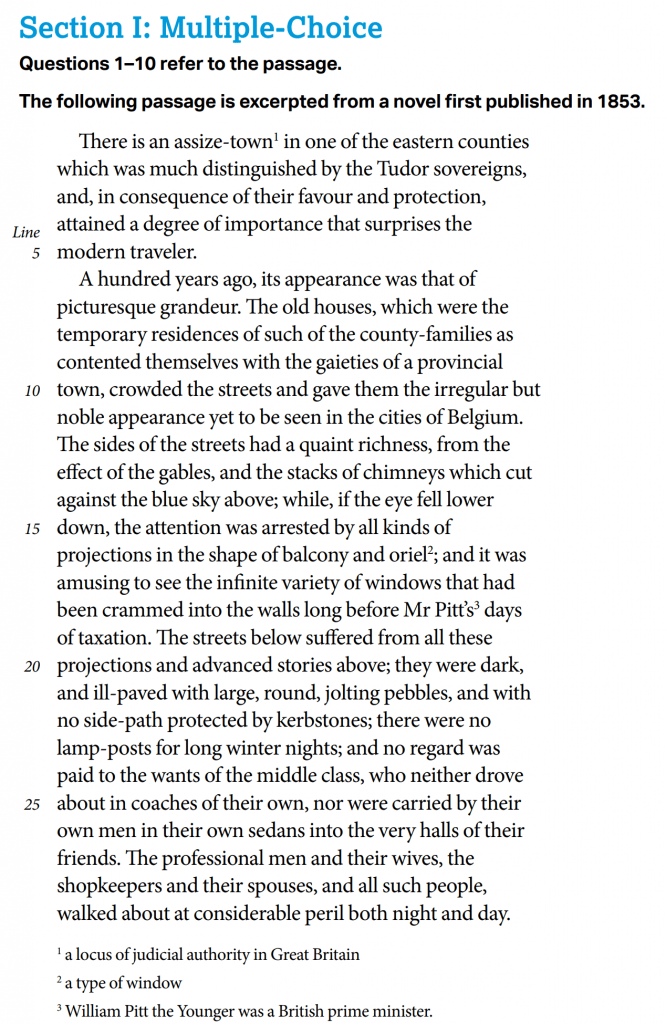
Skill: 5.B Explain the function of specific words and phrases in a text.
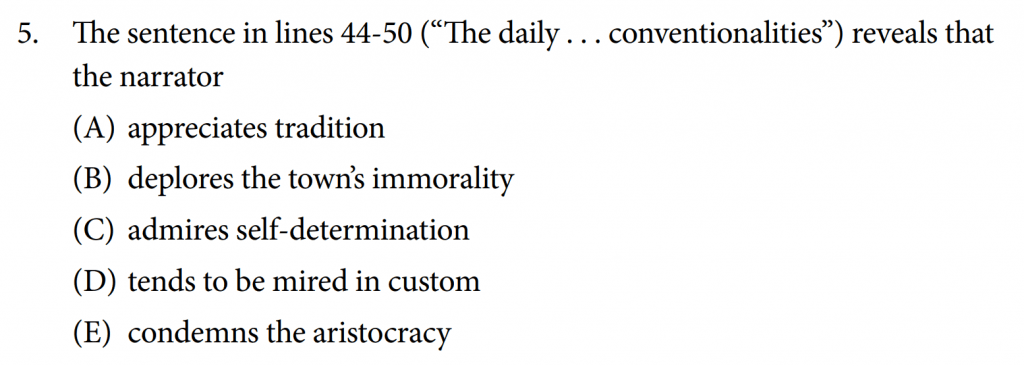
Essential Knowledge: FIG-1.M Descriptive words, such as adjectives and adverbs, qualify or modify the things they describe and affect readers’ interaction with the text.
Skill: 4.C Identify and describe details, diction, or syntax in a text that reveal a narrator’s or speaker’s perspective.
Essential Knowledge: NAR-1.R Information included and/or not included in a text conveys the perspective of characters, narrators, and/or speakers.
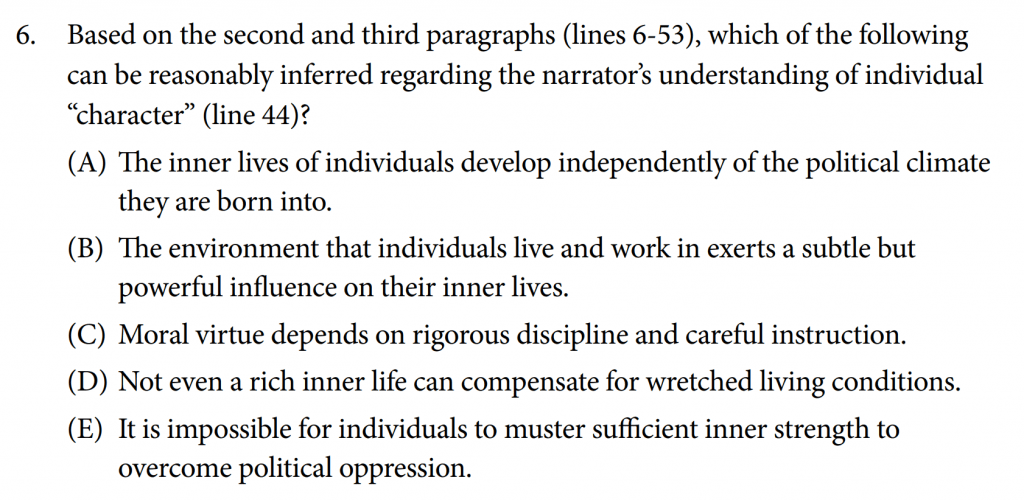
Skill: 3.C Explain the function of structure in a text.
Essential Knowledge: STR-1.F A text’s structure affects readers’ reactions and expectations by presenting the relationships among the ideas of the text via their relative positions and their placement within the text as a whole
Now that we’ve taken a look at samples of multiple-choice questions involving prose fiction, let’s turn our attention toward questions that address poetry.
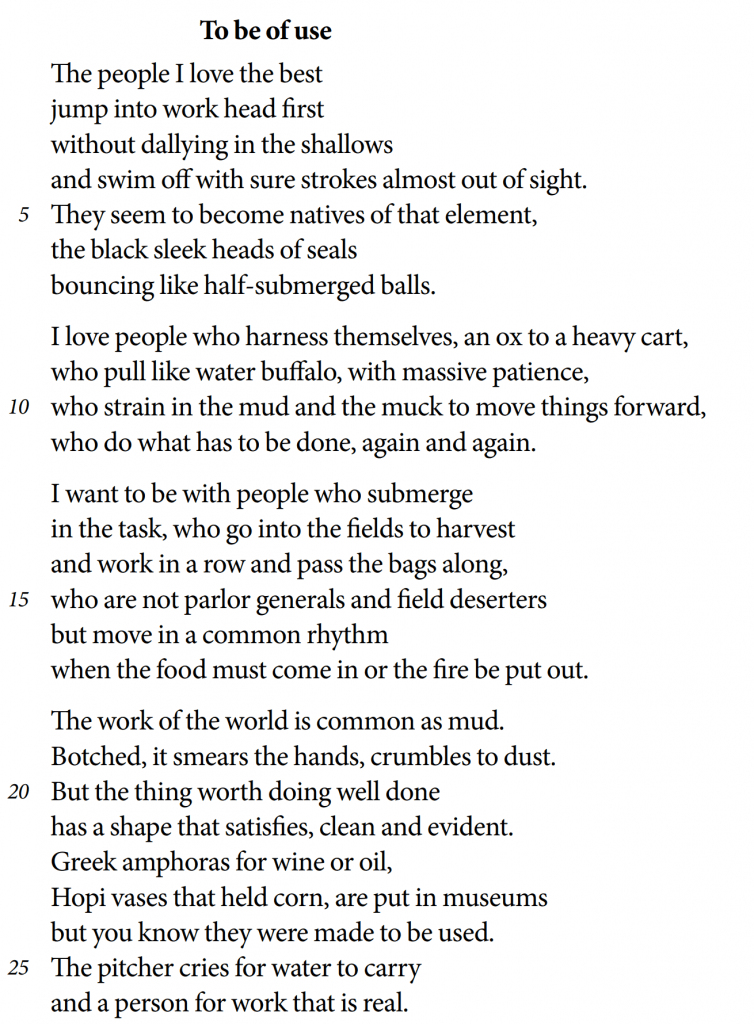
Skill 7.B: Develop a thesis statement that conveys a defensible claim about an interpretation of literature and that may establish a line of reasoning.
Essential Knowledge: LAN-1.D A thesis statement expresses an interpretation of a literary text, and requires a defense, through use of textual evidence and a line of reasoning, both of which are explained in an essay through commentary.
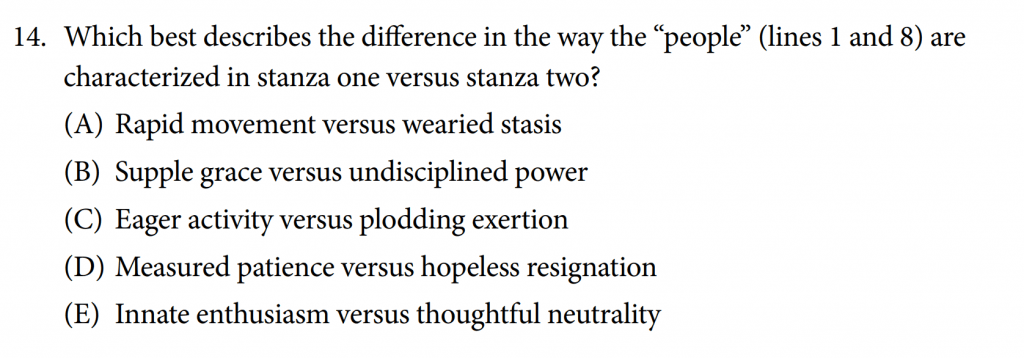
Skill 4.C: Identify and describe details, diction, or syntax in a text that reveal a narrator’s or speaker’s perspective.
Essential Knowledge: NAR-1.X Multiple, and even contrasting, perspectives can occur within a single text and contribute to the complexity of the text.
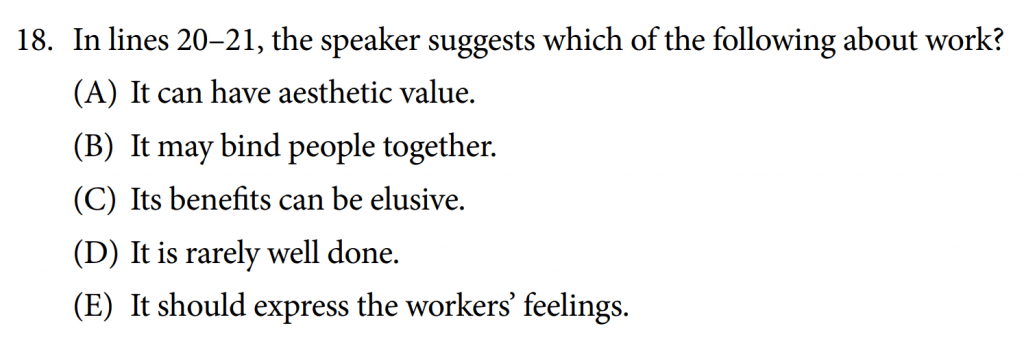
Skill: 5.D Identify and explain the function of an image or imagery.
Essential Knowledge: FIG-1.O Descriptive words, such as adjectives and adverbs, contribute to sensory imagery.
As you see, these questions force you to engage with literature more critically and technically. CollegeBoard’s main objective is to shape you into a budding literary critic capable of producing college-level work, so they consistently ask questions that look like those above.
To develop your skills to a level that would be acceptable by a university, then, the test-makers over at CollegeBoard often craft questions involving analysis of literary devices, character perspective, figurative language, and more. The individual skills assessed by these questions are designed to take your thinking to a much higher level.
Free Response Examples:
The Course and Exam Description (CED) for AP® Lit also provides samples of free response questions. Let’s begin by taking a look at a sample of a poetry-based free response prompt.
Poetry Analysis
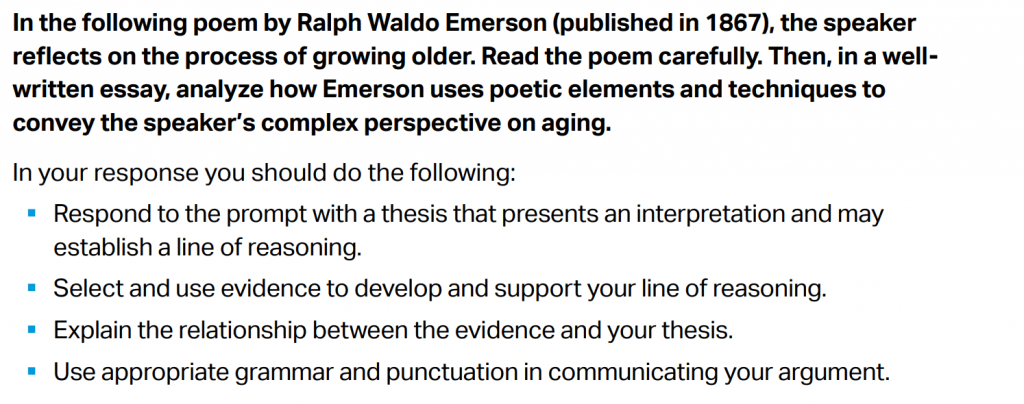
Skills: 4.C, 7.A, 7.B, 7.C, 7.D, 7.E
Note how the prompt is somewhat vague and open-ended. While it does ask you to hone in on a specific topic within the poem—aging—through discussion of the writer’s use of poetic elements and techniques, it also does not specify which of those elements and techniques should be discussed:
- Then, in a well-written essay, analyze how Emerson uses poetic elements and techniques to convey the speaker’s complex perspective on aging.
So, it is imperative that you come to this exam with a deep and clear understanding of literary devices and motifs such as parallelism, imagery, irony, etc.
If you struggle with literary and rhetorical terms, check out our guide on essential AP® Literature Rhetorical Terms !
In a bit, we’ll provide some additional resources to help you build your knowledge of these literary tools.
Prose Fiction Analysis
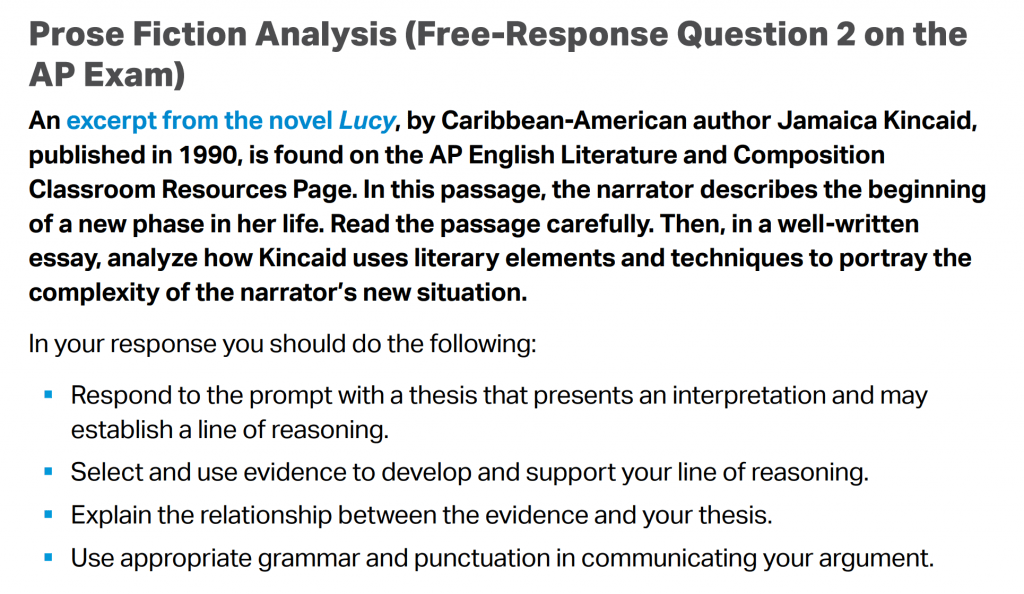
Skills: 1.A, 7.A, 7.B, 7.C, 7.D, 7.E
The prompt requires you to read the excerpt and construct a well-developed literary analysis in response. Like the poetry prompt, note how this prompt is somewhat vague and open-ended. Again, it points you in a direction but leaves it up to you on how you’re going to get there:
- Then, in a well-written essay, analyze how Kincaid uses literary elements and techniques to portray the complexity of the narrator’s new situation.
Therefore, it is imperative that you come to the test prepared with knowledge of literary elements and techniques.
Literary Argument
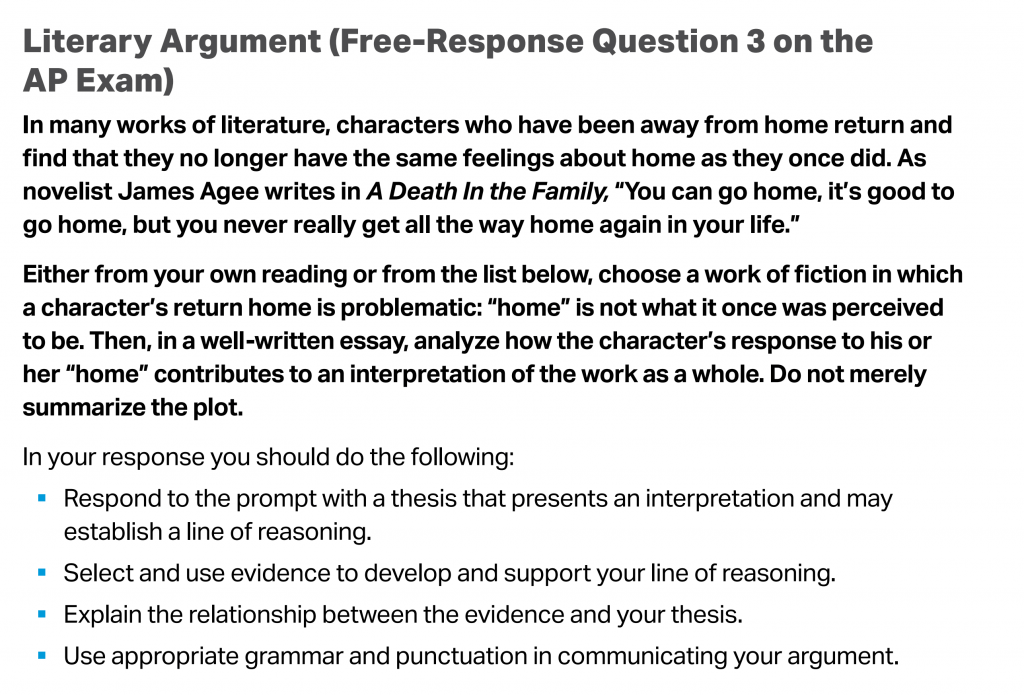
Skills: 1.E, 2.C, 7.A, 7.B, 7.C, 7.D, 7.E
Unlike the other two essays, this prompt contains neither a prose excerpt nor a poem. Rather, it provides a brief quote and then asks you to expand on its central concept and, in our case, the notion of home.
It then provides a list of works that would suit your analysis. You are to select one work from the list or choose another work of literary merit and analyze it in the context of the prompt. Again, note how much of the analysis is up to you. The prompt points you in a direction and then leaves you on your own to select how you’re going to get there.
Therefore, it is imperative that you have not only a solid understanding of literary terms and concepts but also a diverse and deep history of reading. We will direct you toward some additional resources that will strengthen your knowledge below but start by consulting our Ultimate AP® English Literature Reading List to get started!
And if you’re not an avid reader, do not fret! You can guarantee the AP® English Literature and Composition course itself will cover at least one of the books on the list. You will likely be familiar with at least 2-3 of the texts just from taking the course. And if all else fails, you may select your own work of literary merit to discuss!
Free Response Rubric Breakdowns
In previous years, the AP® Lit essays were scored using holistic rubrics on a scale of 0-9. However, after the 2019 exam, the evaluation changed to a new analytic rubric which runs on a scale of 0-6.
Switching to an analytic rubric from a holistic one can be difficult, especially if you’ve already taken another AP® English class or prepared using the holistic version. But, unlike the holistic rubric, the analytic model tells you exactly what to include in your essay to earn maximum points.
Consider the new analytic rubric a How-To Guide, designed to earn you a 6 on each essay. And, unlike the AP® Lang exam, all three AP® Lit essays are graded essentially through the same rubric.
Below, we’ll spend some time breaking down the elements of the new rubric. First, let’s take a look at the Thesis row.
Row A: Thesis (0-1 Points)

A well-developed thesis statement is crucial to making your overall argument effective and convincing. Unsurprisingly, the Thesis row on the rubric is essentially all or nothing; you either earn the point or you don’t.
Let’s break down the wording on the rubric to further understand the significance of the thesis point.
It’s important to note what the rubric warns against:
- No thesis at all
- The thesis only restates the prompt
- The thesis merely summarizes
- The thesis does not respond to the prompt
Doing any of these will miss the mark, and a weak thesis often leads to a weak essay. Rather, the rubric emphasizes that you:
- Respond to the prompt with a thesis that presents a defensible interpretation of the poem, prose passage, or selected work.
Easier said than done, we know. But notice the key phrase, “defensible interpretation.” The basis of your argument, the rubric insists, is entirely up to you as long as you adequately defend and your point. This means you must be ready to dig into the text, cite textual evidence, and analyze your findings sophisticatedly and persuasively. Your thesis, then, must contain a claim.
If thesis statements are particularly troubling to you, we recommend tuning into CollegeBoard’s official online workshop . It’s helpful, really.
Below are two examples of thesis statements from the 2019 exam:
- This thesis statement thoroughly considers both the positive and negative consequences of idealism and explains how this portrayal illuminates the meaning of the work as a whole.
- This thesis statement fails to identify a character and confusingly identifies the government’s repressive efforts as presenting a “fabricated view of an Ideal world.” It ultimately makes no claim and overly generalizes.
Row B: Evidence and Commentary (0-4 Points)

Think of evidence and commentary as the meat of your essay. This is where you will really dig into your argument, cite the text, and make specific claims and arguments.
As mentioned, this portion of the rubric works on a scale of 0-4:
As you see, earning all four points requires direct and specific textual citation and thorough, deep analysis throughout your entire essay. Cite evidence that fits your main argument, do not simply cite for the sake of citation. Always avoid paraphrasing (except on the third free-response question where paraphrasing is acceptable). Do not simply cite text and then give a basic summary. Dig deep and analyze.
If you struggle with analyzing evidence and developing commentary, check out one of our many practice models !
Row C Sophistication (0-1 Points)
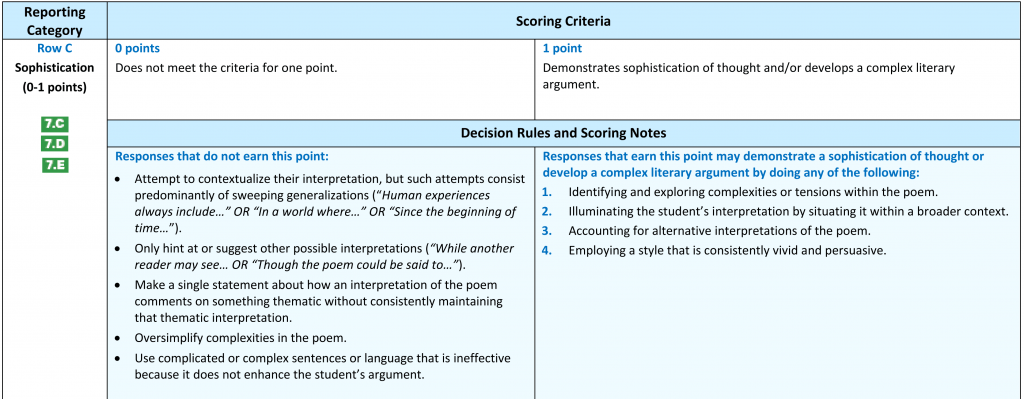
Similar to the Thesis row, the Sophistication evaluation is also all or nothing — you either earn the point or you don’t.
However, earning the sophistication point is not as cut and dry as earning the thesis point. You can’t really pinpoint or locate sophistication in the way you can a thesis statement. If it’s there, it’s everywhere; if not, it’s nowhere.
So to unpack this complex idea, let’s return to the rubric.
The rubric states that essays that earn the point “demonstrate sophistication of thought and/or develop a complex literary argument.”
To be more precise, this means that your essay does these four things:
- Identifies and explores complexities or tensions within the poem, prose passage, or selected work.
- Situates your overall interpretation within a broader, more universal context.
- Accounts for alternative interpretations of the poem, prose passage, or selected work.
- Employs a style that is consistently vivid and persuasive.
Conversely, then, you will not earn the point if your essay:
- Contains sweeping generalizations
- Only hints at other positions or interpretations
- Uses overly complex sentences or language that doesn’t add anything to the argument
Above all, sophistication cannot be reduced to a checkbox. You can’t really add it here or there. It must pervade the entire essay for you to earn the point. It’s a difficult task, but it can be done with a little practice and perseverance.
For additional tips on writing well-developed analyses, check out our guide on how to tackle prose passages !
What Can You Bring to the AP® English Literature and Composition Exam?
If you’re taking the digital exam, you must use a laptop computer (Mac, Windows, or school-managed Chromebook). Because the full-length digital AP® Exams require typewritten free responses, the exams can’t be taken on smartphones. For more details, here is the full digital AP® exam specifications from College Board.
If you’re traveling to a testing location to take an in-person exam, make sure to arrive early. If you’re testing digitally from home, be sure all of your digital login details are confirmed beforehand.
Given the sheer importance and seriousness surrounding AP® exams, the College Board has imposed very strict rules and regulations regarding what you can and cannot bring into your testing room (if you’re testing in-person at a school). Not adhering to these rules can lead to score invalidation and even room-wide exam cancellation, so it’s important to know what you can and cannot bring with you on testing day!
What You Should Bring to Your AP® English Literature Exam
If you’re taking the paper AP® English Literature exam in-person at school, you should bring:
- At least 2 sharpened No. 2 pencils for completing the multiple choice section
- At least 2 pens with black or blue ink only. These are used to complete certain areas of your exam booklet covers and to write your free-response questions. CollegeBoard is very clear that pens should be black or blue ink only, so do not show up with your favorite neon gel pen!
- You are allowed to wear a watch as long as it does not have internet access, does not beep or make any other noise, and does not have an alarm. It should be a standard analog or digital watch, nothing fancy!
- If you do not attend the school where you are taking an exam, you must bring a government issued or school issued photo ID.
- If you receive any testing accommodations , be sure that you bring your College Board SSD Accommodations Letter.
What You Should NOT Bring to Your AP® English Literature Exam
If you’re taking the paper AP® English Literature exam in-person at school, you should NOT bring:
- Electronic devices. Phones, smartwatches, tablets, and/or any other electronic devices are expressly prohibited both in the exam room and break areas. Seriously, do not bring these into the testing room. You could invalidate the entire room’s scores.
- Books, dictionaries, highlighters, or notes
- Mechanical pencils, colored pencils, or pens that do not have black/blue ink. Sometimes the lead used in mechanical pencils cannot be read when run through the scantron reader, so it is best to just avoid them altogether.
- Your own scratch paper
- Reference guides
- Watches that beep or have alarms
- Food or drink
This list is not exhaustive. Be sure to double-check with your teacher or testing site to make sure that you are not bringing any additional prohibited items.
How to Study for AP® English Literature and Composition: 7 Steps
Start with a diagnostic test to see where you stand. Ask your teacher if they can assign you one of our full-length practice tests as a starting point. Your multiple choice will be graded for you, and you can self-score your free response essays using the College Board’s scoring guidelines. If you would prefer to take a pencil and paper test, Princeton Review or Barron’s are two reputable places to start. Be sure to record your score.
Once you’ve completed and scored your diagnostic test, it’s time to analyze the results and create a study plan.
- If you used Albert, you’ll notice that each question is labeled with the skill that it assesses. If any skills stand out as something you’re consistently getting wrong, those concepts should be a big part of your study plan.
- If you used Princeton Review, Barron’s, or another paper test, do your best to sort your incorrect answers into the skill buckets from Albert’s AP® English Literature and Composition Standards Practice .
The tables below sort each set of skills into groups based on their Enduring Understandings and Big Ideas.
Big Idea: Character
ENDURING UNDERSTANDING: Characters in literature allow readers to study and explore a range of values, beliefs, assumptions, biases, and cultural norms represented by those characters.
Big Idea: Setting
ENDURING UNDERSTANDING: Setting and the details associated with it not only depict a time and place, but also convey values associated with that setting.
Big Idea: Structure
ENDURING UNDERSTANDING: The arrangement of the parts and sections of a text, the relationship of the parts to each other, and the sequence in which the text reveals information are all structural choices made by a writer that contribute to the reader’s interpretation of a text.
Big Idea: Narration
ENDURING UNDERSTANDING: A narrator’s or speaker’s perspective controls the details and emphases that affect how readers experience and interpret a text.
Big Idea: Figurative Language
ENDURING UNDERSTANDING: Comparisons, representations, and associations shift meaning from the literal to the figurative and invite readers to interpret a text.
Big Idea: Literary Argumentation
ENDURING UNDERSTANDING: Readers establish and communicate their interpretations of literature through arguments supported by textual evidence.
Once your list of practice questions is complete, check out our Ultimate List AP® English Literature Tips for some pointers.
Now that you’ve developed a study plan for the multiple choice section, it’s time to tackle the FRQs. You should have self-scored your essays using CollegeBoard’s scoring guidelines . If you notice that there is one particular prompt you struggled with, use Albert’s AP® Lit FRQ Approach Guide to help hone your skills!
Check out Albert’s AP® Lit FRQ prompts for more practice!
If you didn’t struggle with a particular prompt as much as you did a particular part of the rubric, try to figure out what went wrong. Does your thesis restate the prompt instead of proposing your own position? Did you generalize too much? Did you remember to provide evidence but forget to augment it with commentary and analysis? Maybe your word choice wasn’t varied enough to earn the sophistication point.
Whatever element you struggled with, have a look at our comprehensive page dedicated to AP® Lit for some expert advice!
Once you’ve developed an effective study plan using the links and practice above, and you’ve identified the skills which need more practice, it’s time to set your plan in motion. Check and mark your calendar. How many days, weeks, or months do you have until your exam? Pace your studying according to this time-frame. Pro-tip: If you only have a few weeks or days to go, prioritize the skills that you scored the lowest on.
About halfway through your study schedule, plan to take a second practice test to check your progress. You can either have your teacher assign another full-length Albert practice test or use one of the additional practice tests included in whatever AP® English Literature and Composition review book you purchased. Use these results to inform the rest of your study schedule. Are there skills that you improved on or scored lower on this time? Adjust accordingly, and use our tips in the next section to guide you.
AP® English Literature and Composition Review: 15 Must Know Study Tips
5 AP® English Literature and Composition Study Tips for Home
1. read as much as possible..
And read widely. Read everything from epic poetry and Victorian novels to New Yorker articles and album reviews to Buzzfeed-style listicles. Read a combination of high and lowbrow texts to make your knowledge more worldly and syncretic.
Make a schedule for personal reading time and stick to it. Reading widely, of course, has incalculable benefits that will not only help you score a 5 on the test but also strengthen your academic performance across the board.
Reading will help you develop a more impressive vocabulary and a better understanding of varied sentence structure and syntax. The more you read, the better equipped you will be to score a 5 on this exam.
2. Become familiar with the Western Canon.
The Western canon, often referred to simply as “The Canon,” is the body of high-culture literature, music, philosophy, and works of art that is highly valued in the West, i.e., the poems, prose passages, and drama selections that you will mostly see on the AP® Lit exam.
The canon contains the “classics,” so to speak, and it includes everything from Homer to Junot Diaz. Cultivating a basic understanding of these texts and their authors will not only familiarize you with the history and development of the English tradition but also strengthen your understanding of the so-called “conversation of literature,” the innumerable and complex ways that authors and their works speak to each other and interact. We recommend reading at least the first chapter of Harold Bloom’s book on the subject to get a basic understanding.
We also insist that you familiarize yourself with the various problems that the perseverance of such a canon produces. During the 80s and 90s, a canon war of sorts took place among English departments, with progressives aiming to dismantle the canon on the grounds that it neglects many African-American, female, queer, and impoverished writers in favor of spotlighting “dead white males.”
This friction between advocates and opponents of the canon is extremely important to the history and status quo of literary criticism, and understanding this battle will deeply enrich your understanding of literature and increase your chances of scoring a 5 on the exam.
3. Read Thomas Foster’s How To Read Literature Like a Professor .
This book is a lively and entertaining introduction to the tools frequently used in literary criticism, including symbolism, theme, context, irony, and more. It is an excellent way to begin thinking deeply about literature, and it offers clear examples of close-reading.
It also discusses a wide variety of works that will help familiarize you with the canon. It’s very accessible too. Buy it, read it, mark it up, and keep it by your side throughout class. It’s a great tool.
4. Make flashcards.
You will need to have a strong understanding of different literary devices, authors, works, and rhetorical techniques, and you don’t want to waste time scrambling for definitions on the day of the exam.
Make yourself some flashcards with the most common literary devices, authors, works, and rhetorical techniques, and carve out at least 30 minutes per day to review. If you’d prefer to use an online resource, make some flashcards over at Quizlet !
5. Form study groups!
The beauty of reading literature is that it often produces different and conflicting responses in people, so discussing literature with your friends is a good way to explore new and diverse perspectives.
What you bring to a text, for instance, may be completely different from what your friend or peer brings. Discussion is a great way to comprehend and investigate difficult works. And it’s also pretty fun!
5 AP® English Literature and Composition Multiple Choice Study Tips
1. practice, practice..
Practice answering multiple choice questions as often as you can. AP® English Literature and Composition multiple choice questions will address either fiction, poetry, or drama, and they will ask you to identify and analyze various literary devices, techniques, and motifs. So study these very devices. If you find yourself totally stuck, consult our guide on how to tackle the multiple choice section .
2. Sharpen your close-reading skills.
The true key to acing the multiple choice section of this exam is staying engaged with the passages provided to you and actively reading. That means staying alert through the passages, marking them up, and engaging with them directly, not passively skimming them.
Find a method of active reading that works best for you. Some like to mark up the passage extensively, while others prefer to just read the passage twice and take notes here and there. Select which method works for you and go with it. However, do not just choose the easy or lazy way out. You’ll regret it later when you receive your scores.
3. Look over the questions before reading the passage.
This is often a semi-controversial piece of advice because it doesn’t work for all readers. But it can be helpful if you’re someone who gets easily distracted when reading old prose passages or difficult poetry!
If you find your mind wandering when reading AP® Lit passages, glancing at the questions beforehand can give your brain a purpose to focus on and a point of entry into the passage. It’s always easiest to begin searching when you know what you’re looking for.
4. Use process of elimination.
Often, an AP® Lit multiple choice question will have one or two answer choices that can be crossed off pretty quickly. So try and narrow your choices down to two possible answers, and then choose the best one.
If this strategy isn’t working on a particularly difficult question or it seems to hold you up longer than you’d like, it’s perfectly okay to circle it, skip it, and come back to it at the end. Do not get hung up on eliminating choices. Rather, use this strategy to make your reading more efficient and quicker.
5. It doesn’t hurt to guess.
Obviously, while guessing on every single question isn’t a good strategy and will lead to a 1 on the exam, an educated guess on particularly difficult questions that you truly don’t know how to answer can help. You are scored only on the number of correct answers you give, not the number of questions you answer, so it makes sense to guess on questions that you seriously have no idea how to answer.
5 AP® English Literature and Composition FRQ Study Tips
1. practice your writing skills by answering questions from collegeboard’s archive of past exam questions or explore our free response practice modules ..
Typically, the same skills are assessed from year to year, so practicing with released exams is a great way to brush up on your analysis skills, and our review practice allows you to pinpoint skills you may need help with.
2. Explore and use the rubric!
The best part about the updated AP® English Literature and Composition revised rubrics and scoring guidelines is that it’s very clear to discern which elements are needed to earn full credit for your essay. Granted, it can be tough to include each element—especially that tricky sophistication section—but the rubric’s outline offers a clear and concise portrait of the perfect essay .
Be sure to construct your thesis statement into a clear and definable interpretation. Provide specific evidence and compelling commentary that supports your thesis. If you check these boxes, then you will have a much greater chance of developing a clear and defensible interpretation.
3. Pay attention to the task verbs employed in your free response prompts .
Task verbs are verbs that essentially indicate what it is you should do in your free response. The three common task verbs include:
- Analyze: Examine methodically and in detail the structure of the topic of the question for purposes of interpretation and explanation.
- Choose: Select a literary work from among provided choices.
- Read: Look at or view printed directions and provided passages.
4. Have a solid understanding of literary devices.
Most of the FRQ’s require you to not only specifically identify a passage’s array of literary and rhetorical devices but also analyze and unpack how those devices construct mood, meaning, tone, and more. Study up, read the aforementioned Foster book , and take a look at our list of 15 Essential Rhetorical Terms to Know For AP® English Literature .
5. Fine-tune your thesis statement.
Your thesis statement is arguably the most important sentence in your essay. It informs the reader of your central argument and summarizes your interpretation, and it sets the tone for the rest of your essay. It is imperative that you master the tricky art of the thesis statement before taking your exam.
Many university writing centers offer online education on thesis statements that can prove extremely beneficial. Consult UNC Chapel Hill’s thesis statement handout for extra help!
The AP® English Literature and Composition Exam: 5 Test Day Tips to Remember
Be sure you put at least something in your stomach before taking the exam, even if it might be in knots from nerves. You don’t need to eat a deluxe breakfast of pancakes, eggs, bacon, biscuits, etc. (unless that’s your routine), but you do need to eat at least something . Your brain and your body need the energy. If you’re hungry during the exam, it might be harder for you to focus, leading to a lower score or an incomplete exam.
2. Make sure you know the location of your testing site before taking the test.
You do not want to be scrambling and running around the school trying to find your testing room on the day of the exam. Know your room number and know how to get there. There’s truly nothing worse than running around your school trying to find a room when a hugely-important test is underway.
If you’re getting a ride from a parent or friend, be sure they know the address beforehand. If you’re taking public transit, check the schedule. If you are taking your exam at your own school, don’t get too comfortable. Be sure you know the room number! This is something small but impactful that you can do to reduce your stress the morning of your exam.

3. Prepare everything you need the night before.
Waking up and scrambling to choose an outfit, find pencils, or make breakfast will just stress you out and put you in a negative headspace. Plan your outfit the night before to reduce stress and have an easy breakfast ready to go.
Being prepared saves time and cuts back unnecessary stress.
And wear something comfortable. You don’t want to be adjusting your outfit throughout the test. It’ll just be distracting.
4. Bring mints or gum with you.
The rules say that you can’t have food or drink in the testing room, but mints and/or gum are usually allowed unless it’s against your testing site’s own rules. If you find yourself getting distracted, pop a mint or a stick of gum in your mouth! This can help to keep you more awake and focused.
5. Remember to breathe and just relax.
Seriously, just breathe. If you’ve followed the rest of the tips in this post, listened to your teacher, read up on your literary devices, and done your homework, then you’re well-prepared for this exam. Trust yourself. Know that you have done all you can do to prepare and don’t cram the morning of the exam. Last-minute studying helps no one, and it often just leads to stress!
AP® English Literature and Composition Review Notes and Practice Test Resources
Ap® collegeboard’s official youtube channel.
This YouTube channel provides tons of tips, advice, and strategies for tackling the AP® English Literature and Composition exam. It offers online seminars and classes on a diverse range of Lit-related topics such as plot structure, unpacking symbolism, and crafting strong commentary. The best thing about it is that real-life teachers lead the classes, so they feel very personalized.
If you’re a more visual learner who thrives on video content, then this channel is perfect for you!
How-to Guide for Literary Analysis Essays
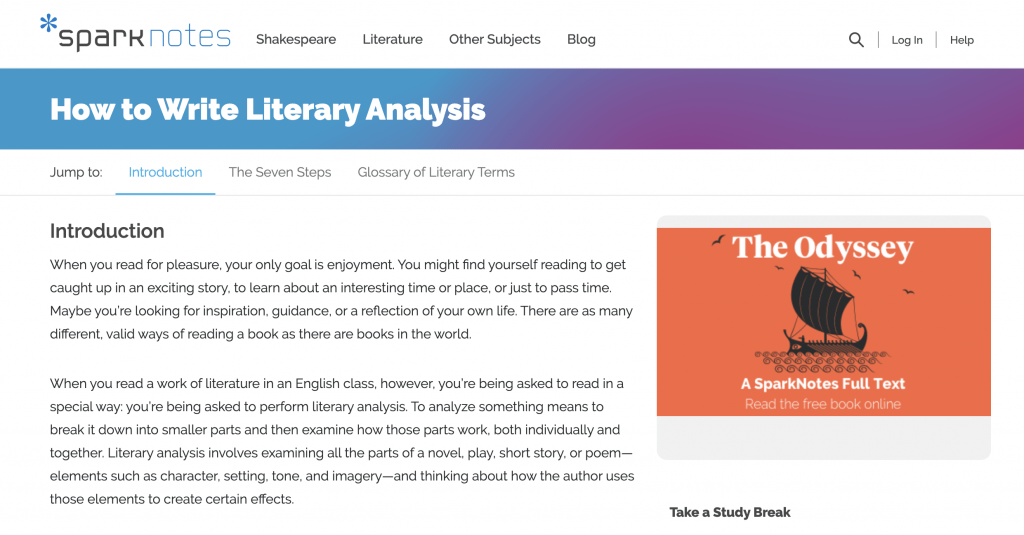
While we 100% do not condone using Sparknotes textual summaries to get your way through AP® English Literature, we do recommend taking a look at some of their guides and workshops and using them as supplementary resources. This how-to guide offers a 7-step method of approaching literary analysis that might help you get the ball rolling if you’re totally stuck.
This guide is perfect for anyone needing to brush up on their writing skills or anyone needing to find a solid step-by-step approach to writing the free response questions.
AP® English Literature Jeopardy Game
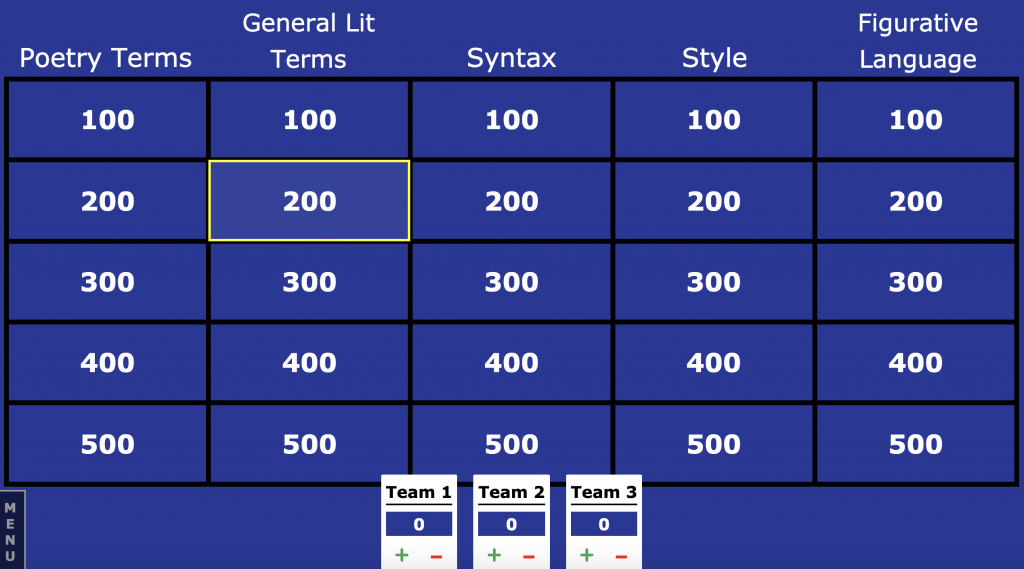
This online Jeopardy game is not only tons of fun but also super helpful in developing your memory and strengthening your understanding of basic literary elements and devices. It contains categories involving poetry terms, general Lit, syntax, style, and figurative language. It’s a great way to review basic terms for the exam, and you can play with up to ten people through its make-your-team feature.
This is a perfect review for anyone looking to quickly review literary terms in a fun way.
Ms. Effie’s Lifesavers
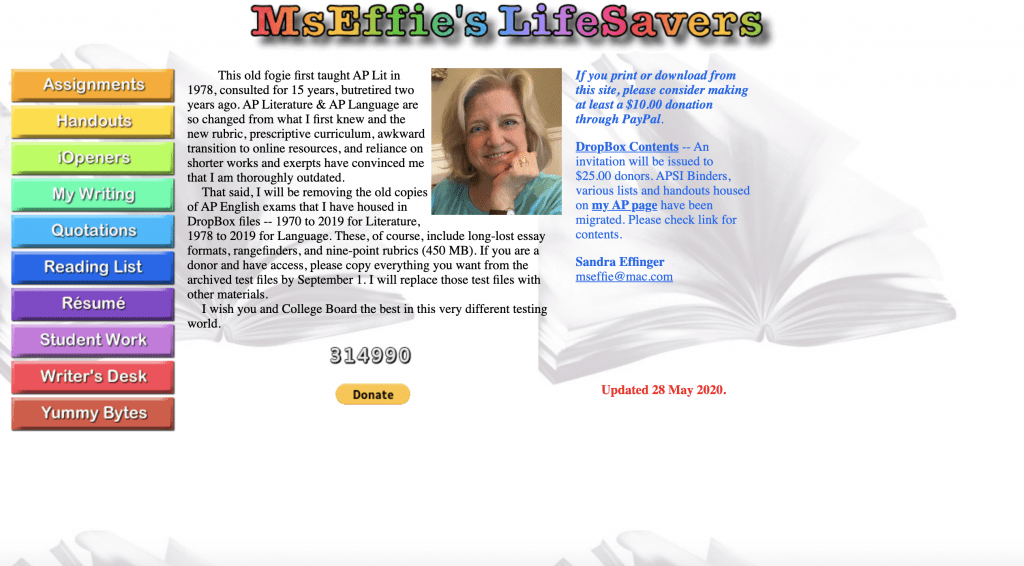
If you’re a seasoned AP® English teacher, Ms. Effie (Sandra Effinger) probably needs no introduction! Ms. Effie’s Lifesavers website has helped many AP® Lang and AP® Lit teachers plan effective and thoroughly aligned lessons and assignments. Sandra was an AP® Reader for many years, so she knows her stuff. She has tons of free content on her page, as well as a Dropbox full of AP® English goodies for anyone who makes a donation via her PayPal. You’ll find resources for both AP® Language and AP® Literature here.
Ms. Effie’s webpage is perfect for all students. Really, it has material that would benefit those looking for quick reviews, deeper analysis of free response questions, or help with multiple choice questions.
Summary: The Best AP® English Literature and Composition Review Guide
Remember, the structure of the AP® Lang exam is as follows:
Because AP® English Literature and Composition is a skills-based course, there’s no way to know what specific passages, poems, authors, or concepts might make it onto the official exam. But, we do know exactly which skills will be assessed with which passages, so it’s best to center your studying around brushing up on those skills!
Use the provided charts to help you understand which skills you should focus on, and use Albert’s AP® English Literature and Composition Course Guide to brush up on your understanding of each skill and its corresponding essential knowledge.
Start with a diagnostic test, either on Albert or with a pencil and paper test via Princeton Review or Barron’s . Once you’ve completed and scored your diagnostic, follow our 7 steps on how to create an AP® English Literature and Composition study plan.
And remember: start reading now! The more you read, the more equipped you will be to ace this exam. Review the Western Canon, study your literary terms, and begin critically engaging with writers!
Practice answering multiple choice questions on Albert and free-response questions from The College Board’s archive of past exam questions.
If you’ve followed the rest of the tips in this post, listened to your teacher, and done your homework, you’re well-prepared for this exam. Trust that you have done all you can do to prepare and don’t cram the morning of. Last-minute studying helps no one!
Interested in a school license?
Popular posts.

AP® Score Calculators
Simulate how different MCQ and FRQ scores translate into AP® scores

AP® Review Guides
The ultimate review guides for AP® subjects to help you plan and structure your prep.

Core Subject Review Guides
Review the most important topics in Physics and Algebra 1 .

SAT® Score Calculator
See how scores on each section impacts your overall SAT® score

ACT® Score Calculator
See how scores on each section impacts your overall ACT® score

Grammar Review Hub
Comprehensive review of grammar skills

AP® Posters
Download updated posters summarizing the main topics and structure for each AP® exam.
Interested in a school license?

Bring Albert to your school and empower all teachers with the world's best question bank for: ➜ SAT® & ACT® ➜ AP® ➜ ELA, Math, Science, & Social Studies aligned to state standards ➜ State assessments Options for teachers, schools, and districts.
What are your chances of acceptance?
Calculate for all schools, your chance of acceptance.
Your chancing factors
Extracurriculars.
How to Write the AP Lit Poetry Essay
What’s covered:.
- How to Write the AP Literature Poetry Essay
- Tips for Writing The AP Lit Poetry Essay
To strengthen your AP Literature Poetry Essay essay, make sure you prepare ahead of time by knowing how the test is structured, and how to prepare. In this post, we’ll cover the structure of the test and show you how you can write a great AP Literature Poetry Essay.
What is the AP Lit Poetry Essay?
The AP Literature exam has two sections. Section I contains 55 multiple choice questions, with 1 hour time allotted. This includes at least two prose fiction passages and two poetry passages.
Section II, on the other hand, is a free response section. Here, students write essays to 3 prompts. These prompts include a literary analysis of a poem, prose fiction, or in a work selected by the student. Because the AP Literature Exam is structured in a specific, predictable manner, it’s helpful to prepare yourself for the types of questions you’ll encounter on test day.
The Poetry Essay counts for one-third of the total essay section score, so it’s important to know how to approach this section. You’ll want to plan for about 40 minutes on this question, which is plenty of time to read and dissect the prompt, read and markup the poem, write a brief outline, and write a concise, well-thought out essay with a compelling analysis.
Tips for Writing the AP Lit Poetry Essay
1. focus on the process.
Writing is a process, and so is literary analysis. Think less about finding the right answer, or uncovering the correct meaning of the poem (there isn’t one, most of the time). Read the prompt over at least twice, asking yourself carefully what you need to look for as you read. Then, read the poem three times. Once, to get an overall sense of the poem. Second, start to get at nuance; circle anything that’s recurring, underline important language and diction , and note important images or metaphors. In your annotations, you want to think about figurative language , and poetic structure and form . Third, pay attention to subtle shifts in the poem: does the form break, is there an interruption of some sort? When analyzing poetry, it’s important to get a sense of the big picture first, and then zoom in on the details.
2. Craft a Compelling Thesis
No matter the prompt, you will always need to respond with a substantive thesis. A meaty thesis contains complexity rather than broad generalizations , and points to specifics in the poem.
By examining the colloquial language in Gwendolyn Brooks’s poem, “We Real Cool”, we can see the tension of choosing to be “cool”. This raises important ideas about education, structure, and routine, and the consequences of living to be “real cool”.
Notice how the thesis provides a roadmap of what is to follow in the essay , and identifies key ideas that the essay will explore. It is specific, and not vague. The thesis provides a bigger picture of the text, while zooming in the colloquial language the speaker uses.
A good thesis points out the why as much as the what . Notice how in the above example, the thesis discusses language in the poem as it connects to a bigger message about the poem. For example, it’s not enough to discuss Emily Dickinson’s enjambment and hyphens. A good thesis will make a compelling argument about why those infamous Dickinson hyphens are so widely questioned and examined. Perhaps a good thesis might suggest that this unique literary device is more about self-examination and the lapse in our own judgement.
3. Use Textual Evidence
To support your thesis, always use textual evidence . When you are creating an outline, choose a handful of lines in the poem that will help illuminate your argument. Make sure each claim in your essay is followed by textual evidence, either in the form of a paraphrase, or direct quote . Then, explain exactly how the textual evidence supports your argument . Using this structure will help keep you on track as you write, so that your argument follows a clear narrative that a reader will be able to follow.
Your essay will need to contain both description of the poem, and analysis . Remember that your job isn’t to describe or paraphrase every aspect of the poem. You also need lots of rich analysis, so be sure to balance your writing by moving from explicit description to deeper analysis.
4. Strong Organization and Grammar
A great essay for the AP Literature Exam will contain an introduction with a thesis (not necessarily always the last sentence of the paragraph), body paragraphs that contain clear topic sentences, and a conclusion . Be sure to spend time thinking about your organization before you write the paper. Once you start writing, you only want to think about content. It’s helpful to write a quick outline before writing your essay.
There’s nothing worse than a strong argument with awkward sentences, grammatical errors and spelling mistakes. Make sure to proofread your work before submitting it. Carefully edit your work, paying attention to any run-on sentences, subject-verb agreement, commas, and spelling. You’d be surprised how many mistakes you’ll catch just by rereading your work.
Common Mistakes on the AP Literature Poetry Essay
It can be helpful to know what not to do when it comes time to prepare for the AP Literature Poetry Essay. Here are some common mistakes students make on the AP Literature Poetry Essay:
1. Thesis is not arguable and is too general
Your thesis should be arguable, and indicate the central ideas you will discuss in your essay. Read the prompt carefully and craft your thesis in light of what the prompt asks you to do. If the prompt mentions specific literary devices, find a way to tie those into your thesis. In your thesis, you want to connect to the meaning of the poem itself and what you feel the poet intended when using those particular literary devices.
2. Using vague, general statements rather than focusing on analysis of the poem
Always stay close to the text when writing the AP Literature Poetry Essay. Remember that your job is not to paraphrase but to analyze. Keep explicit descriptions of the poem concise, and spend the majority of your time writing strong analysis backed up by textual evidence.
3. Not using transitions to connect between paragraphs
Make sure it’s not jarring to the reader when you switch to a new idea in a new paragraph. Use transitions and strong topic sentences to seamlessly blend your ideas together into a cohesive essay that flows well and is easy to follow.
4. Textual evidence is lacking or not fully explained
Always include quotes from the text and reference specifics whenever you can. Introduce your quote briefly, and then explain how the quote connects back to the topic sentence after. Think about why the quotes connect back to the poet’s central ideas.
5. Not writing an outline
Of course, to write a fully developed essay you’ll need to spend a few minutes planning out your essay. Write a quick outline with a thesis, paragraph topics and a list of quotes that support your central ideas before getting started.
To improve your writing, take a look at these essay samples from the College Board, with scoring guidelines and commentary.
How Will AP Scores Affect My College Chances?
While you can self-report AP scores, they don’t really affect your admissions chances . Schools are more interested in how you performed in the actual class, as your grades impact your GPA. To understand how your GPA impacts your college chances, use our free chancing engine . We’ll let you know your personal chance of acceptance at over 1500 schools, plus give you tips for improving your profile.
Related CollegeVine Blog Posts

Recently viewed courses
Recently viewed.
Find Your Dream School
This site uses various technologies, as described in our Privacy Policy, for personalization, measuring website use/performance, and targeted advertising, which may include storing and sharing information about your site visit with third parties. By continuing to use this website you consent to our Privacy Policy and Terms of Use .
COVID-19 Update: To help students through this crisis, The Princeton Review will continue our "Enroll with Confidence" refund policies. For full details, please click here.
Enter your email to unlock an extra $25 off an SAT or ACT program!
By submitting my email address. i certify that i am 13 years of age or older, agree to recieve marketing email messages from the princeton review, and agree to terms of use., guide to the ap english literature and composition exam.

Do you know how to conduct a close reading of prose and poetry? Can you write effectively under time constraints? The AP ® English Literature and Composition exam tests topics and skills discussed in your AP English Literature course. If you score high enough, your AP English score could earn you college credit!
Check out our AP English Literature Guide for what you need to know about the exam:
- Exam Overview
- Structure & Question Types
- How to Prepare
What’s on the AP English Literature & Composition Exam?
The College Board lists 6 Skill Categories that should be covered in your AP English Literature and Composition course, or as you prepare for the test:
- Character—Characters in literature show a wide range of values, beliefs, assumptions, biases, and cultural norms, and provide an opportunity to study and explore what the characters represent.
- Setting—A setting and the details associated with it represent a time and place, but also convey values associated with the setting.
- Structure—Structure refers to the arrangements of sections and parts of a text, the relationship of the parts to each other, and the sequence in which the text reveals information. These are all choices made by a writer that allow you to interpret a text.
- Narration—Any narrator’s or speaker’s perspective controls the details and emphases that readers encounter; therefore, narration affects how readers experience and interpret a text.
- Figurative language—Comparisons, representations, and associations shift meaning from the literal to the figurative. Figurative language can include word choice, imagery, and symbols. Simile, metaphor, personification, and allusions are all examples of figurative language.
- Literary argumentation—How do you write about literature yourself? You develop your interpretation (using the first five of the Big Six!) and then communicate it. You need to develop a thesis—a defensible claim—and support it with textual evidence.
The multiple-choice section of the AP English Literature and Composition exam will be testing your knowledge of the Big Six. Each one is weighted a certain amount in the multiple-choice questions.
AP English Literature & Composition Book List
There is no required reading or book list for the AP English Literature exam, but the College Board provides a list of authors and poets with whom you should be familiar and whose work is of the caliber and density that you are expected to understand. These lists include:
- Poetry: W.H. Auden, Elizabeth Bishop, William Blake, Anne Bradstreet, Edward Kamau Brathwaite, Gwendolyn Brooks, Robert Browning, George Gordon/Lord Byron, Lorna Dee Cervantes, Geoffrey Chaucer, Lucille Clifton, Samuel Taylor Coleridge, Billy Collins, H.D. (Hilda Doolittle), Emily Dickinson, John Donne, Rita Dove, Paul Laurence Dunbar, T.S. Eliot, Robert Frost, Joy Harjo, Seamus Heaney, George Herbert, Garrett Hongo, Gerard Manley Hopkins, Langston Hughes, Ben Jonson, John Keats, Philip Larkin, Robert Lowell, Andrew Marvell, John Milton, Marianne Moore, Sylvia Plath, Edgar Allan Poe, Alexander Pope, Adrienne Rich, Anne Sexton, William Shakespeare, Percy Bysshe Shelley, Leslie Marmon Silko, Cathy Song, Wallace Stevens, Alfred, Lord Tennyson, Derek Walcott, Walt Whitman, Richard Wilbur, William Carlos Williams, William Wordsworth, William Butler Yeats
- Drama: Aeschylus, Edward Albee, Amiri Baraka, Samuel Beckett, Anton Chekhov, Caryl Churchill, William Congreve, Athol Fugard, Lorraine Hansberry, Lillian Hellman, David Henry Hwang, Henrik Ibsen, Ben Jonson, David Mamet, Arthur Miller, Molière, Marsha Norman, Sean O’Casey, Eugene O’Neill, Suzan-Lori Parks, Harold Pinter, Luigi Pirandello, William Shakespeare, George Bernard Shaw, Sam Shepard, Sophocles, Tom Stoppard, Luis Valdez, Oscar Wilde, Tennessee Williams, August Wilson
- Fiction (Novel and Short Story): Chinua Achebe, Sherman Alexie, Isabel Allende, Rudolfo Anaya, Margaret Atwood, Jane Austen, James Baldwin, Saul Bellow, Charlotte Bronte, Emily Bronte, Raymond Carver, Willa Cather, John Cheever, Kate Chopin, Sandra Cisneros, Joseph Conrad, Edwidge Danticat, Daniel Defoe, Anita Desai, Charles Dickens, Fyodor Dostoevsky, George Eliot, Ralph Ellison, Louise Erdrich, William Faulkner, Henry Fielding, F. Scott Fitzgerald, E.M. Forster, Thomas Hardy, Nathaniel Hawthorne, Ernest Hemingway, Zora Neale Hurston, Kazuo Ishiguro, Henry James, Ha Jin, Edward P. Jones, James Joyce, Maxine Hong Kingston, Joy Kogawa, Jhumpa Lahiri, Margaret Laurence, D.H. Lawrence, Chang-rae Lee, Bernard Malamud, Gabriel García Márquez, Cormac McCarthy, Ian McEwan, Herman Melville, Toni Morrison, Bharati Mukherjee, Vladimir Nabokov, Flannery O’Connor, Orhan Pamuk, Katherine Anne Porter, Marilynne Robinson, Jonathan Swift, Mark Twain, John Updike, Alice Walker, Evelyn Waugh, Eudora Welty, Edith Wharton, John Edgar Wideman, Virginia Woolf, Richard Wright
- Expository Prose: Joseph Addison, Gloria Anzaldua, Matthew Arnold, James Baldwin, James Boswell, Joan Didion, Frederick Douglass, W.E.B. Du Bois, Ralph Waldo Emerson, William Hazlitt, bell hooks, Samuel Johnson, Charles Lamb, Thomas Macaulay, Mary McCarthy, John Stuart Mill, George Orwell, Michael Pollan, Richard Rodriguez, Edward Said, Lewis Thomas, Henry David Thoreau, E.B. White, Virginia Woolf
Read More: Review for the exam with our AP English Literature Cram Courses
AP English Literature Structure & Question Types
The AP English Literature & Composition exam takes 3 hours to complete and consists of two sections: a multiple-choice section and a free response section.
Multiple-Choice
AP English Literature multiple-choice questions are grouped in sets. You will be given 5 passages or poems to read, with 8-13 multiple-choice questions to assess your reading comprehension. Each multiple-choice question has 5 answer choices (A through E). That’s a lot of reading then recalling, understanding, and interpreting. Use your time effectively and wisely!
Free Response
- Respond to the prompt with a thesis that presents an interpretation and may establish a line of reasoning.
- Select and use evidence to develop and support your line of reasoning.
- Explain the relationship between the evidence and your thesis.
- Use appropriate grammar and punctuation in communicating your argument.
How to Interpret AP English Literature Scores
AP scores are reported from 1 to 5. Colleges are generally looking for a 4 or 5 on the AP English Literature exam, but some may grant credit for a 3. (Here's a quick overview of AP credit policy .) Each test is curved so scores vary from year to year. Here’s how AP English Lit students scored on the May 2022 test:
Source: College Board
How can I prepare?
AP classes are great, but for many students they’re not enough! For a thorough review of AP English Literature content and strategy, pick the AP prep option that works best for your goals and learning style.
- AP Exams

Explore Colleges For You
Connect with our featured colleges to find schools that both match your interests and are looking for students like you.

Career Quiz
Take our short quiz to learn which is the right career for you.

Get Started on Athletic Scholarships & Recruiting!
Join athletes who were discovered, recruited & often received scholarships after connecting with NCSA's 42,000 strong network of coaches.

Best 389 Colleges
165,000 students rate everything from their professors to their campus social scene.
SAT Prep Courses
1400+ course, act prep courses, free sat practice test & events, 1-800-2review, free digital sat prep try our self-paced plus program - for free, get a 14 day trial, what would you score on the mcat today.
Thank you! Look for the MCAT Review Guide in your inbox.
I already know my score.
Enrollment Advisor
1-800-2REVIEW (800-273-8439) ext. 1
1-877-LEARN-30
Mon-Fri 9AM-10PM ET
Sat-Sun 9AM-8PM ET
Student Support
1-800-2REVIEW (800-273-8439) ext. 2
Mon-Fri 9AM-9PM ET
Sat-Sun 8:30AM-5PM ET
Partnerships
- Teach or Tutor for Us
College Readiness
International
Advertising
Affiliate/Other
- Enrollment Terms & Conditions
- Accessibility
- Cigna Medical Transparency in Coverage
Register Book
Local Offices: Mon-Fri 9AM-6PM
- SAT Subject Tests
Academic Subjects
- Social Studies
Find the Right College
- College Rankings
- College Advice
- Applying to College
- Financial Aid
School & District Partnerships
- Professional Development
- Advice Articles
- Private Tutoring
- Mobile Apps
- Local Offices
- International Offices
- Work for Us
- Affiliate Program
- Partner with Us
- Advertise with Us
- International Partnerships
- Our Guarantees
- Accessibility – Canada
Privacy Policy | CA Privacy Notice | Do Not Sell or Share My Personal Information | Your Opt-Out Rights | Terms of Use | Site Map
©2024 TPR Education IP Holdings, LLC. All Rights Reserved. The Princeton Review is not affiliated with Princeton University
TPR Education, LLC (doing business as “The Princeton Review”) is controlled by Primavera Holdings Limited, a firm owned by Chinese nationals with a principal place of business in Hong Kong, China.

Choose Your Test
Sat / act prep online guides and tips, every ap literature practice test available: free and official.
Advanced Placement (AP)

When you're studying for your AP Literature Exam, you're going to want to use practice tests and questions to hone your skills. But where can you find AP literature practice tests? And are all practice exams equally useful for you?
The real exam has 55 multiple-choice questions and three free-response questions, but there are practice tests with every conceivable number and combination of question types.
In this article, you'll learn where to find every official College Board AP English Literature and Composition practice exam, free unofficial tests, and paid practice test resources. You'll also find out which tests are high-quality and how you can best use different practice exams to fulfill your studying needs.
Official Free AP Literature Practice Tests
The gold standard of AP English Literature practice tests and AP English Literature practice exam questions are College Board released materials . That's because the College Board administers the AP exams, so their practice questions are most like the actual AP questions you'll see on the test.
There are three different kinds of resources offered by the College Board: complete released exams from past years, released free-response questions from past years, and sample questions from the "AP Course And Exam Description."
Official Released College Board Exams
There are three official released College Board Exams. However, only the most recent one (from 2012) is complete. The 1999 and 1987 exams have the standard 55 multiple-choice questions, but both are missing parts of the three question free-response section. You can still use them as complete exams if you supplement them with released free-response questions from past years which we recommend since official multiple-choice problems are hard to come by.
2012 AP English Literature and Composition Exam
This is the best AP Lit practice test available. It's the most recent exam released by the College Board, and it follows the format of the current test with 55 multiple-choice questions and three free-response questions. Definitely make use of this test!
1999 AP English Literature and Composition Exam
This test excludes the poetry and prose analysis questions of the free-response section and only has the student choice question. So, to take it as a complete exam, you'd need to supplement it with questions 1 and 2 from the released free-response questions below . You can actually get question 2 for the 1999 test from the official free-response questions bank, but the excerpt for question 1 can't be reprinted, so you'll need to supplement with another poetry analysis question.
1987 AP English Literature and Composition Exam For reasons that are not totally clear, this exam excludes the third essay question, the poetry analysis. If you want to take this as "complete" exam practice, use a free-response poetry analysis prompt from the bank of free response questions linked below.

Or supplement with this tree-poem.
Official Free-Response Questions
There may not be very many complete released exams, but there are tons of free-response questions available from previous administrations of the test. These are great practice, not just for writing complete essays, but for practicing writing thesis statements, outlines, and so on.
What's also great about these is that most of them come with sample response and scoring guidelines, so you'll be able to see exactly what makes a high-quality AP essay by College Board standards. Be aware, though, that some of the prose and poetry excerpts can't be reprinted due to copyright concerns.
Below is the link to all the free-response questions available. The questions go all the way back to 1999, and since there haven't been many changes to the free-response part of the exam, all of these questions can be useful during your studying.
AP English Lit Free Response Questions 1999-2021
Sample Questions From the Course and Exam Description
The 2019 AP English Literature Course and Exam Description has practice multiple-choice questions and free-response questions.They don't add up to a complete test--there are only 19 multiple-choice questions instead of 55–but there are three free response questions (enough for a full test). Even though there aren’t many multiple-choice questions, they are great for simple practice.
If you're looking for more questions like these, you can revisit the old exam description booklets as well . (Just keep in mind that some of the other information in the booklet may be out of date!)
Your Teacher
Your AP teacher may have access to copies of old AP exams that you can use for practice. They probably can't let you take them out of the classroom, but they may be allowed to loan them to you in a supervised setting. This is because teachers can purchase resources directly from the College Board that students can't. Asking your teacher may not bear fruit, but it's worth a try.

Why are you asking me for AP Lit practice tests? I'm your Econ teacher!
Free Unofficial AP Literature Practice Tests
In addition to the free College Board resources, there are also several places online where you can get free, unofficial practice tests. Be aware that, because these resources aren't College-Board created or approved, they are of variable quality. For each of these resources we'll describe what's offered and how it compares to official College Board tests.
Varsity Tutors AP Literature Practice Tests
This site has multiple-choice practice quizzes divided by concept--things like "interpreting the passage," "claims and argument," and "interpreting excerpts." The questions aren't worded exactly the same way as AP test questions, but they are still okay for testing your passage-interpretation skills. Basically, the questions test for similar skills, but don't necessarily mimic AP test questions in style.
Also, the site provides the date, title, and author of each work, which is not something you'll receive on the AP exam. You can make a free account at the site to track your scores, but it's not necessary to be able to take the tests.

Kittens not included with free practice tests, unfortunately.
Albert AP English Literature Quizzes
Albert offers multiple-choice quizzes divided into prose, poetry, and drama categories. You are given the title, date, and author of the work--which you will not receive on the real AP exam. Like the Varsity Tutors quizzes, Albert offers questions that test similar skills as the AP exam, but the questions are worded differently.
High School Test Prep Tests
This site offers three short multiple-choice practice tests. You're given the title and author of the work. The questions for these tests are fairly surface-level, so I would only use these if you are working on your reading comprehension skills.
CrackAP English Literature Quizzes
CrackAP has over 40 short AP Lit quizzes. Each quiz gives a passage then has 15 multiple-choice questions on it. The questions are somewhat easier than you'll find on the real AP exam, but if you need some quick practice, this can do the trick. This resource also has examples of past free response questions, which can be useful study tools, too!
Practice Quiz AP English Literature
This site offers a 20-question multiple-choice quiz on two passages--one poetry, and one prose. The passages are extremely basic, however, so I would only use this resource if you are working on your reading comprehension skills.
Looking for help studying for your AP exam?
Our one-on-one online AP tutoring services can help you prepare for your AP exams. Get matched with a top tutor who got a high score on the exam you're studying for!

The queens of AP Lit practice give you their blessing.
Paid Unofficial Practice Tests
There are also several paid resources that offer unofficial practice questions.
This is a subscription service with questions for tons of different tests—SAT, ACT, and AP exams.They also have videos and other review resources. We can't really speak to the quality of the questions because the entire service is behind a paywall of about $25 a month.
The Princeton Review AP Literature Study Guide 2021
Published study guides are an excellent way to practice for the AP Literature exam. These books are put together by experts who have inside knowledge of the test, and The Princeton Review is one of the best out there.
This study guide has three practice tests, along with other types of sample questions and expert explanations to help you improve your analytical skills.
Barron's AP English Literature and Composition, 7th Edition
Like The Princeton Review study guide, the Barron's AP Literature study guide is another great resource for students looking for extra exam prep. This guide has four practice tests and sample essay questions , along with an expert walk-through of the AP Literature exam itself.
If you're looking for a guide that gives you practice and provides tips for mastering the exam, this would be a good pick!
This subscription service offers access to tons of test prep, including the SAT, ACT and lots of AP courses. Their AP Literature resources include two full-length practice tests, three sets of flashcards to help you study, and several instructional videos.
Prices for subscriptions start at $39 dollars per month, and some plans include live tutoring and writing instruction . If you choose to subscribe, you get access to all of their course and test-prep materials, so if you’re taking several AP classes, this could be a good source.

I definitely advise paying for all of these resources with whatever loose foreign change you have lying around.
How to Use AP Literature Practice Tests
How to use a given practice test depends somewhat on the resource itself. We'll offer some recommendations here on how to best use different resources.
Complete Official Released Tests
The best way to use a complete official practice test is to do a practice-run for the exam . So find a quiet room, bring a timer or watch so you can time sections, and get to work! This will help you get familiar with the exam experience so you'll feel more comfortable on exam day!
Since there are two complete AP Lit practice tests, it makes sense to take one early on in your studying time, and one later. You can get a parent, tutor or teacher to grade the exams. The early test will help you figure out what you need to work on, and the later test will show you how you've improved! Since the AP English Literature test is more skills-heavy than content-heavy, you shouldn't feel totally lost taking a practice test even in the middle of the school year.
Official Released Free-Response and Sample Questions
Official resources that aren't complete tests are best for practicing individual sections of the test. The sample multiple-choice questions in the "Course and Exam Description" make for great AP English Literature multiple-choice practice--they'll help you get familiar with the style of the questions and practice close-reading.
The wealth of released free-response questions are great resources for building your timed essay-writing skills. You can practice complete essays or develop essay outlines.
Unofficial Practice Tests and Resources
Since unofficial practice tests aren't going to be quite as similar to the real AP exam as official College Board materials, they won't be quite as useful for preparing for the format of the exam or its questions. However, they can be very valuable close-reading practice. And since that's a critical skill for the exam, it's still worth it to use unofficial resources.

Be very quiet. She's close-reading.
Key Takeaways
Practice tests and questions are a hugely important resource as you prep for the AP Lit exam. The gold standard of practice resources are those that come from the College Board, but there are many other places where you can get practice questions that will help you hone your close-reading skills for the exam. Most of the resources listed in this article are free, but a few are paid.
Remember: official College Board practice tests are best for simulating the exam experience. Actual College Board questions are good for focused preparation for individual sections of the exam--especially the essays. Unofficial resources are best used for further honing your close-reading skills after you’ve practiced with the official materials.
Now that you know where to find these resources, you're ready to start studying for your AP Literature exam!

What's Next?
Wondering what you should be reading for AP Lit? Check out our list of 127 great books to help you prepare for the AP Literature exam.
Need more study guidance for your APs? See my five-step AP prep plan. Or see our guide on when to start studying for your APs.
If you're looking for practice tests for other AP exams, see our assembled practice tests for AP US History , AP Chemistry , AP Biology , AP World History , and AP Psychology .
Want to improve your SAT score by 160 points or your ACT score by 4 points? We've written a guide for each test about the top 5 strategies you must be using to have a shot at improving your score. Download it for free now:

These recommendations are based solely on our knowledge and experience. If you purchase an item through one of our links, PrepScholar may receive a commission.

Ellen has extensive education mentorship experience and is deeply committed to helping students succeed in all areas of life. She received a BA from Harvard in Folklore and Mythology and is currently pursuing graduate studies at Columbia University.
Student and Parent Forum
Our new student and parent forum, at ExpertHub.PrepScholar.com , allow you to interact with your peers and the PrepScholar staff. See how other students and parents are navigating high school, college, and the college admissions process. Ask questions; get answers.

Ask a Question Below
Have any questions about this article or other topics? Ask below and we'll reply!
Improve With Our Famous Guides
- For All Students
The 5 Strategies You Must Be Using to Improve 160+ SAT Points
How to Get a Perfect 1600, by a Perfect Scorer
Series: How to Get 800 on Each SAT Section:
Score 800 on SAT Math
Score 800 on SAT Reading
Score 800 on SAT Writing
Series: How to Get to 600 on Each SAT Section:
Score 600 on SAT Math
Score 600 on SAT Reading
Score 600 on SAT Writing
Free Complete Official SAT Practice Tests
What SAT Target Score Should You Be Aiming For?
15 Strategies to Improve Your SAT Essay
The 5 Strategies You Must Be Using to Improve 4+ ACT Points
How to Get a Perfect 36 ACT, by a Perfect Scorer
Series: How to Get 36 on Each ACT Section:
36 on ACT English
36 on ACT Math
36 on ACT Reading
36 on ACT Science
Series: How to Get to 24 on Each ACT Section:
24 on ACT English
24 on ACT Math
24 on ACT Reading
24 on ACT Science
What ACT target score should you be aiming for?
ACT Vocabulary You Must Know
ACT Writing: 15 Tips to Raise Your Essay Score
How to Get Into Harvard and the Ivy League
How to Get a Perfect 4.0 GPA
How to Write an Amazing College Essay
What Exactly Are Colleges Looking For?
Is the ACT easier than the SAT? A Comprehensive Guide
Should you retake your SAT or ACT?
When should you take the SAT or ACT?
Stay Informed
Get the latest articles and test prep tips!
Looking for Graduate School Test Prep?
Check out our top-rated graduate blogs here:
GRE Online Prep Blog
GMAT Online Prep Blog
TOEFL Online Prep Blog
Holly R. "I am absolutely overjoyed and cannot thank you enough for helping me!”
Calculate for all schools
Your chance of acceptance, your chancing factors, extracurriculars, writing an ap lit literary argument essay: what are the key elements.
Hi! I'm taking AP Lit this year and I need some help with the literary argument essay. Can someone give me some guidance on the key elements I need to include, like thesis statement, evidence, structure, etc., to have a strong essay? Thank you so much!
Hey! Here are some key elements to include in your essay for a strong result:
1. Introduction: Start with a hook to engage the reader. Introduce the work you'll be discussing (including the title and author). Provide any necessary context or background info.
2. Thesis statement: In a clear, concise sentence, state your overall argument or claim. This should appear towards the end of your introduction.
3. Body paragraphs: In each body paragraph, present a specific point that supports your thesis. Begin with a topic sentence, provide textual evidence (like quotes), and then analyze the significance of that evidence. Make sure to connect each point back to your thesis.
4. Structure: Make sure your essay follows a logical structure. Each paragraph should flow smoothly into the next, and your ideas should be organized in a coherent manner.
5. Conclusion: Restate your thesis (in slightly different words) and summarize your main points. Finish your essay with a final thought that connects your argument to a broader context or theme.
Good luck with your essay, and I hope this helps!
About CollegeVine’s Expert FAQ
CollegeVine’s Q&A seeks to offer informed perspectives on commonly asked admissions questions. Every answer is refined and validated by our team of admissions experts to ensure it resonates with trusted knowledge in the field.

Lit & More
May 21, 2019 ·
Everything You Need to Know About the New AP Lit Guidelines
Planning Content & Choosing Curriculum

As you may have heard, the AP®* English Literature course is getting a bit of a redesign this summer, becoming effective in Fall of 2019. For the full report released by the College Board, click here . For the remix version, keep reading!
* AP® is a trademark registered by the College Board, which is not affiliated with, and does not endorse, this website . Many AP® Lit teachers are already starting to panic about the new changes because frankly, changes are scary. But based on my reading and some discussion with other AP Lit teachers, I think these changes are positive overall and nothing to be scared of. Here are the main things to know:
The biggest change is that the AP® Lit essay rubric is changing to an analytical, itemized rubric similar to those used on the AP® US History and AP® European History exams. The actual scoring guidelines have not been released yet, but the writing prompts are more specific in what students need to write about. More information will be provided at the AP® Reading this summer and will be sent out to AP® Lit teachers as well.
AP® English Literature seems to be embracing different forms of fiction, perhaps even moving away from the old-fashioned “literary merit” model of years past. Instead, the course description breaks the literature down into three categories:

Much of the new changes to the AP® exam are supported by an abundance of new resources being supplied by College Board on their new AP® Classroom webpage. The webpage is advertised below:

Because of the new emphasis on “short fiction,” AP® teachers are already talking about adding more short fiction, such as excerpts from novels or short stories, and eliminating some longer works. This builds on Senior VP of CollegeBoard Trevor Packer’s tweet last summer hinting that this was the new direction of AP® Lit.

If you are feeling overwhelmed still, that’s perfectly natural. I too had a small moment of hyperventilation when I worried I had to eliminate all novels from my curriculum and add short stories instead. However, after reading further, and talking to some level-headed AP® Lit teachers, here are my personal take-aways:
- These are guidelines. No changes are necessary to your AP® Lit courses, except maybe tweaking your on-demand essay rubrics eventually.
- CollegeBoard will be releasing more practice questions and resources to help new and struggling AP® teachers starting in the fall.
- CollegeBoard may start allowing analysis of shorter prose works, even short stories, on Question 3, which overall means more modern and realistic reading material and student expectations.
Because of a student trip to Italy this June, I am unable to attend the AP® Lit scoring in Salt Lake City. However, I have some friends who are sending me the materials as soon as they get them, and rest assured I am setting aside some time this summer to develop TpT resources based on the new writing expectations. If you have any additional questions for me, or suggestions for future resources, please email me at [email protected] . Finally, I encourage you to check out the new course description (linked above) and sign up for the AP® Classroom resource .
Reader Interactions
July 29, 2019 at 4:32 pm
Thanks for the informative post! I saw on your Instagram a rubric graphic that you made for the new scoring guidelines, but I couldn’t find it anywhere on your linktree. Any chance you could share? Thanks so much!
July 29, 2019 at 4:45 pm
Hi Jen, I can’t remember which rubric I posted on IG but I created two! One for on-demand scoring and one for any other kind of AP writing. Both are aligned with the new CED. Here they are: AP Writing Rubric – https://www.teacherspayteachers.com/Product/AP-Lit-Writing-Rubric-4619561?utm_source=www.aplitandmore.com%2Fblog&utm_campaign=New%20CED%20blog%20comment%20-%20link%201 On-Demand Scoring Rubric – https://www.teacherspayteachers.com/Product/AP-Lit-On-Demand-Scoring-Rubric-4660839?utm_source=www.aplitandmore.com%2Fblog&utm_campaign=New%20CED%20blog%20comment%20-%20link%202
July 29, 2019 at 6:25 pm
This is amazing; thank you!
Latest on Instagram

- Election 2024
- Entertainment
- Newsletters
- Photography
- Personal Finance
- AP Buyline Personal Finance
- Press Releases
- Israel-Hamas War
- Russia-Ukraine War
- Global elections
- Asia Pacific
- Latin America
- Middle East
- March Madness
- AP Top 25 Poll
- Movie reviews
- Book reviews
- Personal finance
- Financial Markets
- Business Highlights
- Financial wellness
- Artificial Intelligence
- Social Media
Easter 2024
What is Palm Sunday and how is it celebrated worldwide?
FILE - Nuns wait for the start of the Palm Sunday’s mass celebrate by pope Francis in St. Peter’s Square at The Vatican Sunday, April 2, 2023. Palm Sunday will be celebrated by Christians worldwide Sunday, March 24, 2024. It commemorates the Christian belief in the triumphant entry of Jesus into Jerusalem, when palm branches were strewn before him. It marks the start of Holy Week. (AP Photo/Andrew Medichini)
FILE - Pierbattista Pizzaballa, the Latin Patriarch of Jerusalem, center, walks in a procession during the Palm Sunday Mass in the Church of the Holy Sepulchre, where many Christians believe Jesus was crucified, buried and rose from the dead, in the Old City of Jerusalem, Sunday, April 2, 2023. TPalm Sunday will be celebrated by Christians worldwide Sunday, March 24, 2024. It commemorates the Christian belief in the triumphant entry of Jesus into Jerusalem, when palm branches were strewn before him. It marks the start of Holy Week. (AP Photo/Maya Alleruzzo, File)
FILE - Christian faithful march carrying green Palm branches to commemorate Palm Sunday, which marks the entry of Jesus Christ into Jerusalem, in the streets of Nairobi, Kenya, Sunday, April 2, 2023. Palm Sunday will be celebrated by Christians worldwide Sunday, March 24, 2024. It commemorates the Christian belief in the triumphant entry of Jesus into Jerusalem, when palm branches were strewn before him. It marks the start of Holy Week. (AP Photo, File)
- Copy Link copied
Palm Sunday commemorates the Christian belief in the triumphal entry of Jesus into Jerusalem, when he was greeted by cheering crowds waving palm branches that they set out on the ground along his path, according to the Bible.
This year, Palm Sunday falls on March 24. Also known as Passion Sunday, it marks the start of Holy Week. The most sacred week of the Christian year includes the Good Friday re-enactment of Jesus’ crucifixion story and death, and their belief in his resurrection on Easter.
Here is a quick look at Palm Sunday’s significance.
IS THERE A DONKEY IN THIS STORY?
The procession of Jesus into Jerusalem is described by the four Gospel writers in the Bible.
The Gospels differ, but based on one expert they agree on this: Jesus rode into Jerusalem on a donkey — or a colt. So, which one is it?
Colt is defined as “a young male horse that is usually not castrated.” But in the Bible, the word meaning “colt” is used almost exclusively for young donkeys, not horses, writes Joanne M. Pierce , professor emerita of religious studies at the College of the Holy Cross.
Pierce writes that this brings to mind a reference from the Book of Zechariah in Jewish scriptures, where the prophet describes a victorious king who enters Jerusalem riding on a donkey.
In Judaism, she says, the passage from Zechariah refers to the Messiah , a spiritual king who would peacefully redeem Israel, and the donkey is interpreted as a sign of humility .
“In Christianity, this animal becomes almost a symbol of Christ himself, given how it patiently suffers and bears others’ burdens,” Pierce writes in a piece published by The Conversation . “Horses, on the other hand, tend to be associated with royalty, power and war.”
WHAT ABOUT THE PALMS?
In the biblical Palm Sunday story, a cheering crowd greeted Jesus along the road. Some spread their garments on the ground; others threw down leafy branches they had cut from the fields. In the Gospel of John, they are branches from palms, a tree that symbolized victory and triumph.
In the Gospel of Matthew, people began to shout: “Hosanna to the son of David! Blessed is the one who comes in the name of the Lord! Hosanna in the highest heaven!” The word “Hosanna” was a plea for salvation and an exclamation of adoration.
After the procession, the Bible says Jesus entered Jerusalem and went into the temple.
HOW IS PALM SUNDAY CELEBRATED?
The ritual or liturgy typically starts with a blessing of the palms by clergy. It’s followed by a reading of the Passion of Christ, meaning an account of the final events of Jesus’ life.
Some ceremonies in German-speaking countries used to include a figure of Jesus riding a donkey, Encyclopedia Britannica says . The figure is called a “ Palmesel ,” or German for “palm donkey,” according to New York’s Metropolitan Museum of Art, which on its site recounts how worshippers would lay palms on the ground before the Palmesel during lively processions.
Christian pilgrims in the Holy Land mark Palm Sunday by holding Masses and processions retracing Jesus’ triumphal entry. Worshippers carry palm fronds and olive branches and march from the top of the neighboring Mount of Olives to Jerusalem’s historic Old City, home to holy sites of the three Abrahamic monotheistic faiths.
In churches around the world, the palms are often taken home by congregants, and some will become ashes.
HOW DO THE PALMS TURN INTO ASHES?
Ashes can be purchased, but some churches make their own by burning the palms from prior years.
They’re used to make the ashes for Ash Wednesday , the solemn day of fasting and reflection that signals the start of Christianity’s most penitent season.
Associated Press religion coverage receives support through the AP’s collaboration with The Conversation US, with funding from Lilly Endowment Inc. The AP is solely responsible for this content.

IMAGES
VIDEO
COMMENTS
The AP Literature Exam is a three-hour exam that contains two sections in this order: An hour-long, 55-question multiple-choice section. A two-hour, three-question free-response section. The exam tests your ability to analyze works and excerpts of literature and cogently communicate that analysis in essay form.
The AP Lit Exam will ask you to write an essay with an essay with a clear, defensible thesis statement that makes an argument about the story, based on some literary elements in the short story. After reading the passage, you might talk about how foreshadowing, allusion, and dialogue work together to demonstrate something essential in the text.
7. The Prose Passage Essay. This is the second AP Lit essay. It is somewhat similar to the poetry essay, but instead of a poem, you are given a prose passage to analyze. Some things that can make your argument very strong is paying attention to themes, literary devices, characters/persona, and diction. The suggested time is also 40 minutes. 8.
Download free-response questions from past exams along with scoring guidelines, sample responses from exam takers, and scoring distributions. If you are using assistive technology and need help accessing these PDFs in another format, contact Services for Students with Disabilities at 212-713-8333 or by email at [email protected]. Note ...
The free response essays are graded by college and AP Lit teachers following a standardized rubric. Below are 3 example free response questions from 2019's AP Literature Exam: 1. "Carefully read P. K. Page's 1943 poem "The Landlady." Then, in a well-organized essay, analyze the speaker's complex portrayal of the landlady.
The AP English Literature and Composition Exam has consistent question types, weighting, and scoring guidelines every year, so you and your students know what to expect on exam day. There will also be a consistent range of difficulty in the reading passages across all versions of the exam from year to year. The free-response questions will be ...
The AP Lit exam is similar to the AP Lang exam in format, but covers different subject areas. The first section is multiple-choice questions based on five short passages. ... The AP Lit prose essay is the second of the three essays included in the free-response section of the AP Lit exam, lasting around 40 minutes in total. A prose passage of ...
Course Skills. The AP English Literature and Composition framework included in the course and exam description outlines distinct skills that students should practice throughout the year—skills that will help them learn to read texts critically. Skill Categories. Exam Weighting (Multiple- Choice Section) Explain the function of character. 16% ...
The AP English Literature and Composition exam is 3 hours long and consists of two sections: multiple-choice and free-response. The multiple-choice section is worth 45% of the exam score and consists of 55 questions that students have 1 hour to complete. The free-response section is worth 55% of the exam score and consists of 3 questions that ...
The AP® English Literature and Composition exam is designed to test your ability to think critically and analyze literary excerpts. The test is three hours long and consists of a multiple-choice portion (worth 45% of your grade) and a free response portion (worth 55% of your grade). The best way to score a 5 on the AP® English Literature exam ...
In previous years, the AP® Lit essays were scored using holistic rubrics on a scale of 0-9. However, after the 2019 exam, the evaluation changed to a new analytic rubric which runs on a scale of 0-6. ... You will need to have a strong understanding of different literary devices, authors, works, and rhetorical techniques, and you don't want ...
The AP Literature exam has two sections. Section I contains 55 multiple choice questions, with 1 hour time allotted. This includes at least two prose fiction passages and two poetry passages. Section II, on the other hand, is a free response section. Here, students write essays to 3 prompts.
In AP English, writing is taught as "process"—that is, thinking, planning, drafting the text, then reviewing, discussing, redrafting, editing, polishing, and finishing it. It's also important that AP students learn to write "on call" or "on demand.". Learning to write critical or expository essays on call takes time and practice.
Topics may include: Interpreting the role of character in fiction. Identifying and interpreting setting. Understanding how a story's structure affects interpretations. Understanding and interpreting a narrator's perspective. Reading texts literally and figuratively. The basics of literary analysis.
The AP English Literature & Composition exam takes 3 hours to complete and consists of two sections: a multiple-choice section and a free response section. Timing. Number of questions. % of Exam Score. Section 1. 60 minutes. 55 multiple-choice questions. 45%. Section 2.
Thanks! 3 months ago. You can find high-scoring essay examples for the AP Lit Exam on the College Board website. They provide samples of student responses along with the corresponding scores and commentary. Navigate to the year you want, and you'll find samples with detailed explanations. Here's the link to their resources: https://apcentral ...
Certainly! The AP Literature and Composition Exam consists of three essays that you'll need to write within a 2-hour time frame. Here's a breakdown of the three types of essays: 1. Poetry Analysis Essay: In this essay, you will be provided with a poem and given a prompt that asks you to analyze specific elements of the poem. The prompt may ask you to examine the speaker's tone, the use of ...
The 2019 AP English Literature Course and Exam Description has practice multiple-choice questions and free-response questions.They don't add up to a complete test--there are only 19 multiple-choice questions instead of 55-but there are three free response questions (enough for a full test). Even though there aren't many multiple-choice ...
The AP® English Literature and Composition exam focuses on reading, assessing, and writing about imaginative literature like fiction, poetry, and drama. You'll learn to analyze how writers use language to convey both meaning and pleasure. The AP English Lit exam assesses your mastery of the topics, concepts, and skills learned during the course.
1. Introduction: Start with a hook to engage the reader. Introduce the work you'll be discussing (including the title and author). Provide any necessary context or background info. 2. Thesis statement: In a clear, concise sentence, state your overall argument or claim. This should appear towards the end of your introduction.
These are guidelines. No changes are necessary to your AP® Lit courses, except maybe tweaking your on-demand essay rubrics eventually. CollegeBoard will be releasing more practice questions and resources to help new and struggling AP® teachers starting in the fall. CollegeBoard may start allowing analysis of shorter prose works, even short ...
Then, in a well-written essay, analyze how that character's response to the hierarchy contributes to an interpretation of the work as a whole. ... AP® English Literature and Composition 2022 Scoring Guidelines. Reporting Category Scoring Criteria . Row C Sophistication (0-1 points) ... different or unique ways, depending on the text they ...
AP English Literature and Composition students should practice writing prompts that challenge their ability to analyze and interpret literary works across different genres and time periods. These AP Literature writing prompts can be seamlessly integrated into brief 5-minute bell-ringers or concise exit tickets, as well as longer assignments ...
The AP is solely responsible for this content. The Associated Press is an independent global news organization dedicated to factual reporting. Founded in 1846, AP today remains the most trusted source of fast, accurate, unbiased news in all formats and the essential provider of the technology and services vital to the news business.